Feed aggregator
New Covers
Sitrep: So, Goodlifeguide is a bit saturated at the moment so no garuntees that we'll see the manuscript back before the upcoming holiday.
In other news, I noticed some blog posts complaining about my covers. So, I spent the week poking around at 8 of them. I tried a few before with mixed results. This time I took a piecemeal approach with many. Some are enhanced with AI some like Regeneration have no AI enhancements, I just shifted the point of view.
To be clear: Same book, just new cover.







 I will be replacing the old covers with these in the coming days.
I will be replacing the old covers with these in the coming days.Free Fiction Monday: Patriotic Gestures
Crime scene investigator Pamela Kinney hears the bad guys outside her house and smells smoke, but only realizes the next morning the crime they committed—burning the flag that had covered her daughter’s casket.
Her police colleagues call it a small crime, but she disagrees. She must solve it, and she must solve it now.
Chosen as one of the best mystery stories of the year, “Patriotic Gestures” explores the fine lines that run through American culture, and sometimes through Americans themselves.
“Patriotic Gestures“ is available for one week on this site. The ebook is available on all retail stores, as well as here.
Patriotic Gestures By Kristine Kathryn Rusch
Pamela Kinney heard the noise in her sleep—giggles, followed by the crunching of leaves. Later, she smelled smoke, faint and acrid, and realized that her neighbors were burning garbage in their fireplace again. She got up long enough to close the window and silently curse them; she hated it when they did illegal burning.
She forgot about it until the next morning. She stepped out her back door into the crisp fall morning, and found charred remains of her flag in the middle of her driveway. There’d been no wind during the night, fortunately, or all the evidence would have been gone.
Instead, there was a pile of burned fabric and a burn stain on the pavement. There were even footprints outlined in leaves.
She noted all of that with a professional’s detachment—she’d eyeballed more than a thousand crime scenes—before the fabric itself caught her attention. Then the pain was sudden and swift, right above her heart, echoing through the breastbone and down her back.
Anyone else would have thought she was having a heart attack. But she wasn’t, and she knew it. She’d had this feeling twice before, first when the officers came to her house and then when the chaplain handed her the folded flag which just a moment before had draped over her daughter’s coffin.
Pamela had clung to that flag like she’d seen so many other military mothers do, and she suspected she had looked as lost as they had. Then, when she stood, that pain ran through her, dropping her back to the chair.
Her sons took her arms, and when she mentioned the pain, they dragged her to the emergency room. She had been late for her own daughter’s wake, her chest sticky with adhesive from the cardiac machines and her hair smelling faintly of disinfectant.
And the feeling came back now, as she stared at the massacre before her. The flag, Jenny’s flag, had been ripped from the front door and burned in her driveway.
Pamela made herself breathe. Then she rubbed that spot above her left breast, felt the pain spread throughout her body, burning her eyes and forming a lump in the back of her throat. But she held the tears back. She wouldn’t give whoever had done this awful thing the satisfaction.
Finally she reached inside her purse for her cell, called Neil—she had trouble thinking of him as the sheriff after all the years she’d known him— and then she protected the scene until he arrived.
***
It only took him five minutes. Halleysburg was still a small town, no matter how many Portlanders sprawled into the community, willing to make the one and a half hour one-way daily commute to the city’s edge. Pamela had told the dispatch to make sure that Neil parked across the street so that any wind from his vehicle wouldn’t move the leaves.
And she had asked for a second scene-of-the-crime kit because she didn’t want to go inside and get hers. She didn’t want to risk losing the crime scene with a moment of inattention.
Neil pulled onto the street. His car was an unwieldy Olds with a souped up engine and a reinforced frame. It could take a lot of punishment, and often did.
As a result, the paint covering the car’s sides was fresh and clean, while the hood, roof and trunk looked like they were covered in dirt.
The sheriff was the same. Neil Karlyn was in his late fifties, balding, with a face that had seen too much sun. But his uniform was always new, always pristine, and never wrinkled. He’d been that way since college, a precise man with precise opinions about a difficult world.
He got out of the Olds and did not reach around back for a scene-of-the-crime kit. Annoyance threaded through her.
“Where’s my kit?” she asked.
“Pam,” he said gently, “it’s a low-level property crime. It’ll never go to trial and you know it.”
“It’s arson with malicious intent,” she snapped. “That’s a felony.”
He sighed and studied her for a moment. He clearly recognized her tone. She’d used it often enough on him when they were students at the University of Oregon. When they were lovers on different sides of the political fence, and constantly on the verge of splitting up.
When they finally did, it had taken years for them to settle into a friendship. But settle they did. They hardly even fought any more.
He went back to the car, opened the back seat and removed the kit she’d requested. She crossed her arms, waiting as he walked toward her. He stopped at the edge of the curb, holding the kit tight against his leg.
“Even if you somehow get the D.A. to agree that this is a cockamamie felony, you know that processing the scene yourself taints the evidence.”
“Why do you care so much?” she asked, hearing an edge in her voice that usually wasn’t there. The challenge, unspoken: It’s my daughter’s flag. It’s like murdering her all over again.
To his credit, Neil didn’t try to soothe her with a platitude.
“It’s the eighth flag this morning,” he said. “It’s not personal, Pam.”
Her chin jutted out. “It is to me.”
Neil looked down, his cheek moving. He was clenching his jaw, trying not to speak.
He didn’t have to.
She understood the irony of the statement. Somewhere in her pile of college paraphernalia was a badly framed newspaper clipping that had once been the front page of the Portland Oregonian. She’d framed the clipping so that a photo dominated, a photo of a much-younger Pamela with long hair and a tie-dye t-shirt, front and center in a group of students, holding an American flag by a stick, watching as it burned.
God, she could still remember how that felt, to hold a flag up so that the wind caught it. How fabric had its own acrid odor, and how frightened she’d been at the desecration, even though she’d been the one to light the flag on fire.
She had been protesting the Vietnam War. It was that photo and the resulting brouhaha it caused, both on campus and in the State of Oregon itself, that had led to the final break-up with Neil.
He couldn’t believe what she had done. Sometimes she couldn’t either. But she felt her country was worth fighting for. So had he. He joined up not two months later.
To his credit, Neil didn’t say anything about her own flag-burning as he handed her the kit. Instead he watched as she took photographs of the scene, scooped up the charred bits of fabric, and made a sketch of the footprint she found in the leaves.
She found another print in the yard, and that one she made a cast of. Then she dusted her front door for prints, trying not to cry as she did so.
“A flag is a flag is a flag,” she used to say.
Until it draped over her daughter’s coffin.
Until it became all she had left.
***
“I called the local VFW, Mom,” her son Stephen said over dinner that night. Stephen was her oldest and had been her support for thirty years, since the day his father walked out, never to return. “They’re bringing another flag.”
She stirred the mashed potatoes into the creamed corn on her plate. The meal had come from KFC: her sons had brought a bucket with her favorite sides, and told her not to argue with them about the fast food meal.
She wasn’t arguing, but she didn’t have much of an appetite.
They sat in the dining room, at the table that had once held four of them. Pamela had slid the fake rose centerpiece in front of Jenny’s place, so she wouldn’t have to think about her daughter.
It wasn’t working.
“Another flag isn’t the same, dumbass,” Travis said. At thirty, he was the youngest, unmarried, still finding himself, a phrase she had come to hate.
The hell of it was, Travis was right. It wasn’t the same. That flag these people had burned, that flag had comforted her. She had clung to it on the worst afternoon of her life, her fingers holding it tight, even at the emergency room, when the doctors wanted to pry it from her hands.
It had taken almost a week for her to let it go. Stephen had come over, Stephen and his pretty wife Elaine and their teenage daughters, Mandy and Liv. They’d brought KFC then, too, and talked about everything but the war.
Until it came time to take the flag away from Pamela.
Stephen had talked to her like she was a five-year-old who wanted to take her blankie to kindergarten. In the end, she’d handed the flag over. He’d been the one to find the old flagpole, the one she’d taken down when she bought the house, and he’d been the one to place the pole in the hanger outside the front door.
“The VFW says they replace flags all the time,” Stephen said to his brother.
“Because some idiot burned one?” Travis asked.
Pamela’s cheeks flushed.
“Because people lose them. Or moths eat them. Or sometimes, they get stolen,” Stephen said.
“But not burned,” Travis persisted.
Pamela swallowed. Travis didn’t remember the newspaper photo, but Stephen probably did. It had hung over the console stereo she had gotten when her mother died, and it had been a teacher—Neil’s first grade teacher? Pamela couldn’t remember—who had seen it at a party and asked if she really wanted her children to see that before they could understand what it meant.
“I don’t want another one,” Pamela said.
“Mom….” Stephen started in his most reasonable voice.
She shook her head. “It’s been a year. I need to move on.”
“You don’t move on from that kind of loss,” Travis said, and she wondered how he knew. He didn’t have children.
Then she looked at him, a large broad-shouldered man with tears in his eyes, and remembered that Jenny had been the one who walked him to school, who bathed him at night, who usually tucked him in. Jenny had done all that because Stephen at thirteen was already working to help his mom make ends meet, and Pamela was working two jobs herself, as well as attending community college to get her degree in forensic science and criminology. A pseudoscience degree, one of her almost-boyfriends had said. But it wasn’t. She used science every day. She needed science like she needed air.
Like she needed to find out who had destroyed her daughter’s flag.
“You don’t move on,” Pamela said.
Her boys watched her. Sometimes she could see the babies they had been in the lines of their mouths and the shape of their eyes. She still marveled at the way they had grown into men, large men who could carry her the way she used to carry them.
“But,” she added, “you don’t have to dwell on it, every moment of every day.”
And yet she was dwelling. She couldn’t stop. She never told her sons or anyone else, not even Neil who had become a closer friend in the year since Jenny had died. Neil, a widower now, a man who understood death the way that Pamela did. Neil, whose grandson had enlisted after 9/11 and had somehow made it back.
She was dwelling and there was only one way to stop. She had to use science to solve this. She couldn’t think about it emotionally. She had to think about it clinically.
She had her evidence and she needed even more.
The next morning, the local paper ran an article on the burnings, and listed the addresses in the police log section. So Pamela visited the other crime scenes with her kit and her camera, identifying herself as an employee of the State Crime Lab.
Since CSI debuted on television, that identification opened doors for her. She didn’t have to tell the other victims that she had been a victim too.
She took pictures of scorch marks on pavement and flag holders wrenched loose of their sockets. She removed flag bits from garbage cans, and studied footprints in the leaf-covered grass to see if they looked similar to the ones on her lawn.
And late that afternoon, as she stepped back to photograph yet another twisted flag holder beside a front door, she saw the glint of a camera hiding in a cobwebby corner of the door frame. The house was a starter, maybe 1200 square feet total. She wouldn’t have expected a camera here.
“Do you have a security system?” she asked the homeowner, a woman Travis’s age who looked like she hadn’t slept in weeks. Her name was Becky something. Pamela hadn’t really heard her last name in the introduction.
“My husband put it up,” Becky said, her voice shaking a little. “I have no idea how it works.”
“When will he be back?” Pamela asked.
Becky shrugged. “When they cancel stop-loss, I guess.”
Pamela felt her breath slide out of her body. “He’s in Iraq?”
Becky nodded. “I put the flag up for him, you know? And I haven’t told him what happened to it. I’ve gotta find someone to fix the holder, and I have to get another flag.”
Pamela looked at the house more closely. It needed paint. The bushes in front were overgrown. There were cobwebs all over the windows, and dry rot on the sills. Obviously the couple had purchased it expecting someone to work on it.
Either the money wasn’t there, or the husband had planned to do the work himself.
“I can fix the holder,” Pamela said. “If you have a few tools.”
“My husband does,” Becky said. “I can show them to you.”
“I have a few things to finish, and then you can show me,” Pamela said.
She dusted for prints, and then, for comparison, took Becky’s and some off the husband’s comb, which hadn’t been touched since he left. Then Pamela went into his workroom, which also hadn’t been touched, and took a hammer, some screws, and a screwdriver.
It took only ten minutes to repair the flag holder. But in that time, she’d made a friend.
“How’d you learn how to do that?” Becky asked.
“Raised three kids alone,” Pamela said. “You realize there’s not much you can’t do, if you just try.”
Becky nodded.
Pamela glanced at the camera. Untended since the husband left. It was probably in the same state of disrepair as the rest of the house.
“Can I see the security system?” she asked.
“It’s not really a system,” Becky said. “Just the cameras, and some motion sensors that’re supposed to alert us when someone’s on the property. But they clearly don’t work any more.”
“Let me see anyway,” Pamela said.
Becky took her past the workroom, into a small closet filled with electronics. The closet was warm from the heat the panels gave off. Lights still blinked.
Pamela stared at it all, then touched the rewind button on the digital recorder. On the television monitor, she watched an image of herself fixing the flag holder.
“It looks like the camera’s still working,” she said. “Mind if I rewind farther?”
“Go ahead.”
Backwards, she watched darkness turn to day. Saw Neil inspect the hanger. Saw Becky crying, then the tears evaporate into a stare of disbelief before she backed off the porch and away from the scene.
Back to the previous night. No porch light. Just images blurred in the darkness. Faces, not quite real, mostly turned away from the camera.
“Got a recordable DVD?” Pamela asked.
“Somewhere.” Becky vanished into the house. Pamela studied the system, hoping that she wouldn’t erase the information as she tried to record it.
She rewound again. Studied the faces, the half turned heads. She saw crew cuts and piercings and hoodies. Slouchy clothes worn by half the young people in Halleysburg.
Nothing to identify them. Nothing to separate them from everyone else in their age group.
Like her, her hair long, her jeans torn, as she stood front and center at the U of O, a burning flag before her.
She made herself study the machine, and figured out how to save the images to the disk’s hard drive so that they wouldn’t be erased. Then she inspected the buttons near the machine’s DVD slot.
“Here,” Becky said, thrusting a packet at her.
DVD-Rs, unopened, dust-covered. Pamela used a fingernail to break the seal, then pulled one out, and inserted it in the slot. She managed to record, but had no way to test. So she made a few more copies, feeling somewhat reassured that she could come back and try to download the images from the hard drive again.
“Will this catch them?” Becky asked while she watched the process.
“I don’t know,” Pamela said. “I hope so.”
“It’s just, they got so close, you know.” Becky’s voice shook. “I didn’t know anyone could get that close.”
It took Pamela a moment to understand what she meant. Becky meant that they had gotten close to the house. Close to her. The burning hadn’t just upset her, it had frightened her, and made her feel vulnerable.
Odd. All it had done to Pamela was make her angry.
“Just lock up at night,” Pamela said after a minute. “Locks deter ninety-percent of all thieves.”
“And the remaining ten percent?”
They get in, Pamela almost said, but thought the better of it.
“They don’t usually come to places like Halleysburg,” she said. “Why would they? We all know each other here.”
Becky nodded, seemingly reassured. Or maybe she just wanted to abandon an uncomfortable topic.
Pamela certainly did. She wanted to play with the images, see what she could find.
She wanted a solid image of the culprits, one that she could bring to Neil.
Maybe then, he would stop complaining that this was a petty property crime. Maybe then he might understand how important this really was.
***
But it was her own words that replayed in her head later that night as she sat in front of her computer.
They don’t usually come to places like Halleysburg…. We all know each other here.
She had lied to make Becky feel better, but the words hadn’t felt like a lie. Thieves really didn’t come here. There was no need. There was richer pickings in Portland or Salem or the nearby bedroom communities.
Besides, it was hard to commit a crime here without someone seeing you.
Except under cover of darkness.
Her home office was quiet. It overlooked the back yard, and she had never installed curtains on the window, preferring the view of the year-round flower garden she had planted. At the moment, her garden was full of browns and oranges, fall plants blooming despite the winter ahead. She had little lights beneath the plants, lights she usually kept off because they spiked her energy bill.
But she had them on now. She would probably have them on for some time to come.
Maybe Becky wasn’t the only one who felt vulnerable.
Pamela put one of the DVDs in her computer, and opened the images. They played, much to her relief, so she copied the images to her hard drive and removed the DVD.
Her computer at home wasn’t as good as her computer at work. But it would have to do.
She didn’t want to do any work on this case at the State Crime Lab if she could help it. The lab was so understaffed and so overworked that it usually took four months to get something tested. When she last checked, more than 600 cases were backlogged, some of them dating back more than nine months.
Those cases were bigger than hers. The backlogs were semen samples from possible rapists and blood droplets from the scene of a multiple murder case.
She couldn’t, in good conscience, bring something personal and private to the lab. She would work here as long as she could. Then if she couldn’t finish here, she might be able to convince herself that the time she took at the lab would go toward an arson case—a serious one, not a petty property crime, as Neil had called it.
Petty property crime.
Funny that they would be on opposite sides of this issue too.
Pamela went through the images frame by frame, looking for clear faces. Her computer didn’t have the face recognition software that one of the computers at the lab had, but she had installed a home version of image sharpening software. She used it to clean out the fuzz and to lighten the darkness, trying to find more than a chin or the corner of an ear.
Finally she got a small face just behind the flag, a serious white face with a frown—of disapproval? She couldn’t tell—and a bit of an elongated chin. Enough to see the wisp of a beard—a boy’s beard, more a wish of a beard than the real thing—and a tattooed hand coming up to catch the flag as the person almost blocking the camera yanked the pole out of the holder.
She blew up the image, softened it, fixed it, and then felt tears prick her eyes.
They don’t usually come to places like Halleysburg.
No. They grew up here. And worked at the grocery store down the street to pay for their football uniforms at the underfunded high school. They collected coins in a can on Sunday afternoons for Boosters, and they smiled when they saw her and respectfully called her Mrs. Kinney and asked, with a little too much interest, how her granddaughters were doing.
“Jeremy Stallings,” she whispered. “What the hell were you thinking?”
And she hoped she knew.
***
Neil wouldn’t let her sit in while he questioned Jeremy Stallings. He was appalled she’d even asked.
“That sort of thing belongs on TV and you know it,” he’d said.
But she also knew he probably wouldn’t do much more than slap the boy on the wrist, so what would be the harm? She hadn’t made that argument, though.
Instead, she waited on the bench chair outside the sheriff’s office conference room, which doubled as an interview room on days like this, and watched the parade of parents and lawyers as they trooped past.
No one acknowledged her. No one so much as looked at her. Not Reg Stallings, whose brother had sold her the house, or his wife June, who had taken over the PTA just before Travis got out of high school. No one mentioned the friendly exchanges at the high school football games or the hellos at the diner behind the movie theater. It was easier to forget all that and pretend they weren’t neighbors than it was to acknowledge what was going on inside that room.
Then, finally, Jeremy came out. He was wearing his baggy pants with a Halo t-shirt hanging nearly to his knees. He wore that same frown he’d had as he took the flag off from Becky’s front door.
He glanced at Pamela, then looked away, a blush working its way up the spider tattoo on his neck into his crew cut.
His parents and the lawyers led him away, as Neil reminded all of them to be in court the following morning.
Neil waited until they went through the front doors before coming over to Pamela.
She stood, her knees creaky from sitting so long. “He confess?”
Neil nodded. “And gave me the names of his buddies.”
Pamela bit her lower lip. “Funny,” she said, “he didn’t strike me as the type to be a war protestor.”
Neil rubbed his hands on his pristine shirt. “Is that what you thought?”
“Of course,” Pamela said. “Every house he hit, we’re all military families.”
“Who happened to be flying flags, even at night.” There was a bit of judgment in Neil’s voice.
She knew what he was thinking. People who knew how to handle flags took them down at dusk. But she couldn’t bear to touch hers. She hadn’t asked Becky why hers remained up, but she would wager the reason was similar.
And it probably was for every other family Jeremy and his friends had targeted.
“That’s the important factor?” she asked. “Night?”
“And beer,” Neil said. “They lost a football game, went out and drank, and that fueled their anger. So they decided to act out.”
“By burning flags?” Her voice rose.
“A few weeks before, they knocked down mailboxes. I’m going to hate to charge them. There won’t be much left of the football team.”
“That’s all right,” Pamela said bitterly. “Petty property crimes shouldn’t take them off the roster long.”
“It’s going to be more than that,” Neil said. “They’re showing a destructive pattern. This one isn’t going to be fun.”
“For any of us,” Pamela said.
***
Her hands were shaking as she left. She had wanted the crime to mean something. The flag had meant something to her. It should have meant something to them too.
God, Mom, for an old hippie, you’re such a prude. Jenny’s voice, so close that Pamela actually looked around, expecting to see her daughter’s face.
“I’m not a prude,” she whispered, and then realized she was reliving an old argument between them.
Sure you are. Judgmental and dried up. I thought you protested so that people could do what they wanted.
Pamela sat in the car, her creaky knees no longer holding her.
No, I protested so that people wouldn’t have to die in another senseless war, she had said to her daughter on that May afternoon.
What year was that?
It had to be 1990, just before Jenny graduated from high school.
I’m not going to die in a stupid war, Jenny had said with such conviction that Pamela almost believed her. We don’t do wars any more. I’m going to get an education. That way, you don’t have to struggle to pay for Travis. I know how hard it’s been with Steve.
Jenny, taking care of things. Jenny, who wasn’t going to let her cash-strapped mother pay for her education. Jenny, being so sure of herself, so sure that the peace she’d known most of her life would continue.
To Jenny, going into the military to get a free education hadn’t been a gamble at all.
Things’ll change, honey, Pamela had said. They always do.
And by then I’ll be out. I’ll be educated, and moving on with my life.
Only Jenny hadn’t moved on. She’d liked the military. After the First Gulf War, she’d gone to officer training, one of the first women to do it.
I’m a feminist, Mom, just like you, she’d said when she told Pamela.
Pamela had smiled, keeping her response to herself. She hadn’t been that kind of feminist. She wouldn’t have stayed in the military. She wasn’t sure she believed in the military—not then.
And now? She wasn’t sure what she believed. All she knew was that she had become a military mother, one who cried when a flag was burned.
Not just a flag.
Jenny’s flag.
And that’s when Pamela knew.
She wanted the crime to mean something, so she would make sure that it did.
***
She brought her memories to court. Not just the scrapbooks she’d kept for Jenny, like she had for all three kids, but the pictures from her own past, including the badly framed front page of the Oregonian.
Five burly boys had destroyed Jenny’s flag. They stood in a row, their lawyers beside them, and pled to misdemeanors. Their parents sat on the blond bench seats in the 1970s courtroom. A reporter from the local paper took notes in the back. The judge listened to the pleadings.
Otherwise, the room was empty. No one cheered when the judge gave the boys six months of counseling. No one complained at the nine months of community service and even though a few of them winced when the judge announced the huge fines that they (and not their parents) had to pay, no one said a word.
Until Pamela asked if she could speak.
The judge—primed by Neil—let her.
Only she really didn’t speak. She showed them Jenny. From the baby pictures to the dress uniform. From the brave eleven-year-old walking her brother to school to the dust-covered woman who had smiled with some Iraqi children in Baghdad.
Then Pamela showed them her Oregonian cover.
“I thought you were protesting,” she said to the boys. “I thought you trying to let someone know that you don’t approve of what your country is doing.”
Her voice was shaking.
“I thought you were being patriotic.” She shook her head. “And instead you were just being stupid.”
To their credit, they watched her. They listened. She couldn’t tell if they understood. If they knew how her heart ached—not that sharp pain she’d felt when she found the flag, but just an ache for everything she’d lost.
Including the idealism of the girl in the picture. And the idealism of the girl she’d raised.
When she finished, she sat down. And she didn’t move as the judge gaveled the session closed. She didn’t look up as some of the boys tried to apologize. And she didn’t watch as their parents hustled them out of court.
Finally, Neil sat beside her. He picked up the framed Oregonian photograph in his big, scarred hands.
“Do you regret it?” he asked.
She touched the edge of the frame.
“No,” she said.
“Because it was a protest?”
She shook her head. She couldn’t articulate it. The anger, the rage, the fear she had felt then. Which had been nothing like the fear she had felt every day her daughter had been overseas.
The fear she felt now when she looked at Stephen’s daughters and wondered what they’d chose in this never-ending war.
“If I hadn’t burned that flag,” she said, “I wouldn’t have had Jenny.”
Because she might have married Neil. And even if they had made babies, none of those babies would have been Jenny or Stephen or Travis. There would have been other babies who would have grown into other people.
Neil wasn’t insulted. They had known each other too long for insults. Instead, he put his hand over hers. It felt warm and good and familiar. She put her head on his shoulder.
And they sat like that, until the court reconvened an hour later, for another crime, another upset family, and another broken heart.
___________________________________________
“Patriotic Gestures“ is available for one week on this site. The ebook is available on all retail stores, as well as here.
Patriotic Gestures
Copyright © 2016 by Kristine Kathryn Rusch
First published published in Scene of The Crime, edited by Dana Stabenow, Running Press, 2008
Published by WMG Publishing
Cover and Layout copyright © 2016 by WMG Publishing
Cover design by WMG Publishing
Cover art copyright © Americanspirit/Dreamstime
This book is licensed for your personal enjoyment only. All rights reserved. This is a work of fiction. All characters and events portrayed in this book are fictional, and any resemblance to real people or incidents is purely coincidental. This book, or parts thereof, may not be reproduced in any form without permission.
Review of The River Has Roots by Amal El-Mohtar
When I first heard about The River Has Roots, I was simultaneously intrigued by it and hesitant to read it. The idea of a story about Faerie and sisters based on a murder ballad appealed to me, but my only previous experience with Amal El-Mohtar’s work was a sample from the novella she co-authored, This Is How You Lose the Time War—a book that for all its awards and accolades has now failed to draw me in and demand I […]
The post Review of The River Has Roots by Amal El-Mohtar first appeared on Fantasy Cafe.The Inheritance: Chapter 6 Part 1
Bonus points for correctly identifying the popular culture reference.

Drishya Chandran blinked her big brown eyes. On paper, she was twenty-one. To Elias, she looked about fifteen at most.
It’s not that the kids are getting younger; it’s that I’m getting older.
“I’m sorry,” Drishya said. “I honestly didn’t see anything.”
They had commandeered the Elmwood Public Library and through the glass window of the conference room Elias could see the gate looming like a dark hungry mouth, bathed in the glow of the floodlights. No matter how many lives they threw into it, it would never be enough. It was past one in the morning, and he was out of coffee.
“Walk me through it one more time,” he said.
“The drill head jammed,” Drishya said. “I showed it to Melissa. She said to go get the new one from the cart in the tunnel. I went to get it. The next thing I know Wagner is running out of the tunnel, and Melissa is behind him, and her face doesn’t look right. I’m like okay, I guess we are doing that now, so I turned around and ran to the gate. I heard an explosion behind us, so I didn’t look back. I didn’t even know London made it until I was out.”
“Why was the cart in the tunnel and not at the site?” Elias asked.
“It didn’t fit. The site slopes to the stream and there wasn’t a lot of flat ground, so we could only get three of the four carts in.” Drishya counted off on her fingers. “Cart One had the generator, lights, and first aid, so it had to come in. Carts Two and Three were for the ore. Adamantite is heavy, so we didn’t want to carry it too far. Cart Four with the spare parts had to live outside.”
“So there was adamantite at the site?” He’d read Leo’s notes of Melissa’s interview, but it seemed almost unbelievable that so much adamantite could exist in one place.
“Oh yes. That’s how my drill broke. Chipped off a chunk this big.” Drishya held her hands out as if lifting an invisible basketball.
“Was the adamantite in plain view?”
The miner shook her head. “No. Buried, and half of it underwater. It took the DeBRA about 10 minutes to find it. She had to mark it with paint for us.”
Was this why they were attacked? Was something protecting the ore?
Drishya sighed. “It’s awful, isn’t it? Everyone is dead.”
“It is, and they are,” Elias confirmed.
“I knew we would get a big bonus when we found the gold, and then the DeBRA came up with adamantite. I was so excited. I thought I could finally put a deposit on the house. My mom isn’t doing so well. I’ve got to get us out of the apartment, and I’m the only one working.”
Gold? What gold? “I’m sorry your mother is in bad health, and that you had to go through this trauma. You may want to see Dr. Park. He has a room set up downstairs.”
“I’m okay. I didn’t see any of it,” Drishya said. “I’ve only been working for 6 months. I didn’t even know people that well…”
He’d seen this before. Some people grieved when faced with death, others got angry, and some tried to disconnect themselves from what happened.
“I understand,” he said. “Still, it might be a good idea. You’ve lost colleagues in a sudden traumatic way. Things like that can fester.”
“I’ll think about it,” she said.
“So how much gold was there?”
“A lot. It was everywhere in the water, like rocks. We weren’t even drilling; we were pulling it out by hand. Nuggets the size of an apple. We ended up dumping like fifty pounds of it to make room for the adamantite, and we’d been only gathering it for about five minutes.”
“I see. I appreciate your help, Ms. Chandran. The guild is grateful for your assistance. Please get some rest.”
She got up and paused. “You are a lot less scary than I thought you would be.”
“That’s good to hear.”
“Just so you know, Wagner told me not to talk to you.”
Elias raised his eyebrows. “Oh?”
“He said that miners don’t go into the breaches with guildmasters. They go with escort captains. He said it was something to keep in mind.”
“Thank you for your honesty.”
She nodded and walked out.
Elias pulled up the interview notes on his tablet. Neither Melissa nor London said anything about the gold. Malcolm wouldn’t have seen the adamantite, but gold was an entirely different beast.
Was it just gold? Was that it? He’d been wracking his brain, trying to find the reason for the lapse in procedure, having this back and forth with Leo, wondering what he was missing, and all this time, the answer was depressingly simple. Well, no shit, Sherlock, here it is. Greed.
He had put so many regulations and checks in place, and somehow greed always won. He was so fucking tired. Things were much simpler in the breach. The enemy was in front, the support was behind, and he didn’t have to wade through the swamp of human failings. He couldn’t wait to get out of this conference room and into his armor. He had a powerful urge to slice something with his sword.
Leo appeared in the open doorway like a wraith manifesting, met his gaze, and stepped back.
“Come inside and shut the door,” Elias growled.
Leo came in and closed the door behind him.
“Sit.”
Leo sat.
“Why do baby miners think I’m scary?”
“Because you are, sir. Most people find a man who can cut a car in a half with a single strike and then throw the pieces at you frightening.”
“Hmm.”
“Also we offer the highest pay and the best benefits among the top tier guilds, and you are their boss who holds their livelihood in his gauntleted fingers…”
Elias raised his hand. “Did you know there was gold at the mining site?”
Leo’s eyes flashed with white. “I did not.”
“Apparently it was in the water. Nuggets the size of apples. Finally, I know something before you do.”
“Congratulations, sir.”
Elias let that go, pulled up the map of the site on his tablet, and pointed at the three tunnels, each carrying a current of water that merged into a single stream. “Gold washes downstream.”
“Malcolm left the tunnels open because he wanted to maximize the profit from the site.” Leo’s face snapped into a hard flat mask. “He must’ve expected that once they cleared the site, they would gather more gold upstream.
“Remind me, how much did Malcolm make last year?”
“Seven million.”
“I want to know why gold got him so excited that he risked nineteen lives by leaving the tunnels unsecured.”
“Nineteen?” Leo frowned. “The mining crew, the escort, the DeBRA…”
“And the dog.”
“Oh.”
“Malcolm took a significant risk. That’s not just greed. That’s desperation. How are his finances?”
“Squeaky clean as of the last audit, which was two months ago. Credit score of 810, low debt to assets, less than 10K owed on credit cards. I’m following up on a couple of things. We should know more in a few hours. Do you want me to get Wagner in to talk to you?”
“He won’t tell me anything. Wagner is forty-nine years old. He was a coal miner before the gates appeared, and we are his third guild. He’s used to getting screwed over by his bosses.”
“So, he developed an adversarial relationship with us despite fair treatment,” Leo said. “Seems counterintuitive.”
“It doesn’t matter what kind of treatment he gets. He’s cooked. He doesn’t trust us, he will never trust us, and he will always resent us no matter how many benefits he gets.”
“That’s not even logical.”
“It isn’t. It’s an ingrained emotional response. Trust me, we won’t get anything out of him. I’d like you to reinterview Melissa instead. As you said, I’m scary, so she may do better with you. Don’t be confrontational. Be sympathetic and understanding. Make it us against the government: we need to tell the DDC something and we need her help to make them go away. Imply that her cooperation will be remembered and appreciated.”
Leo nodded. “Should I bring up the families?”
Elias shook his head. “Normally the foreman would be the last to get out, just before the escorts. She was at the head of the pack. Either she was incredibly lucky, or she abandoned her crew and ran for her life. Either way, there is guilt there. If you lean too hard on it, she might shut down. Go with ‘you were just doing your job, and we don’t blame you for surviving’ instead. Get her a coffee, get some cookies, interview her in a comfortable setting, and see if she thaws and starts talking. If she goes off on a tangent, let her. Don’t rush. You are her friend; you are there to listen.”
Leo nodded. “Will do.”
“Did Haze get the children?”
“Yes. They’ve just arrived at HQ. I still don’t think this is wise.”
Twenty-eight people died in the breach. Fourteen members of the assault crew, nine miners, four escorts, and Adaline Moore. Twelve of the deceased left behind minor children. Of all of them, only Adaline Moore’s kids had no immediate family to take care of them.
The media devoured any news related to the guilds and gates, and the death of a prominent DeBRA would set off fireworks. Once the news broke, Adaline’s children would become the center of a news cycle. They would be overwhelmed, used, wrung dry for the sake of the cheap emotional punch, and then abandoned to their grief. If they were lucky, the country would forget they existed. If they were unlucky, someone would take note of two vulnerable orphans with a million-dollar life insurance payout.
“I will not allow Adaline’s children to be fed to the media circus,” Elias said. “They are safer at the Guild HQ. DDC hasn’t made any notifications yet, but we both know it will get out. I don’t need some asshole showing up at their door, sticking a microphone into their faces, and asking how they feel about their mother dying. All Haze told them was that Adaline is missing in the breach. They will find out what happened from me, personally.”
He would take care of that in the morning.
“Adaline Moore would have made provisions,” Leo said.
“I’m sure she did. Until we know what they are, we will take care of it.”
“This will be seen as Cold Chaos controlling access to the children because we have something to hide. We are trying to minimize the media’s attention, but they love conspiracies. In an effort to keep the story small, we may end up making it bigger.”
“That’s fine. If they want to paint us as the villain of that story, let them. We will survive. We are the third largest guild in the country.”
Leo sighed quietly.
“I called Felicia,” Elias told him.
Felicia Terrell was a powerhouse attorney, and she specialized in guild-related litigation. He spoke to her two hours ago. She called him a marshmallow and promised to show up first thing in the morning. The children would be well protected from everyone, including Cold Chaos.
Elias leaned back. He was so over it. As soon as he hammered the assault team together, he would enter the gate. He couldn’t wait to get out of this conference room. There was no politics in the breach.
Leo was still sitting in the chair. Some other problem must’ve reared its ugly head.
“Lay it on me,” Elias said.
“We can’t find Jackson.”
“What do you mean, you can’t find him?”
“He was supposed to fly out of Tokyo twenty minutes ago. He didn’t make it to the plane, and he isn’t answering his phone. I’m on it.”
Jackson was arguably the best healer in the US. He didn’t drink, he didn’t do drugs, and his biggest vice was collecting expensive bonsai. The man did not go AWOL. Jackson was always where he was supposed to be. He was calm, competent, powerful, and respected wherever he went, because he did things like walk into other guilds’ gates and rescue their assault teams from disaster when asked. Nothing could happen to Jackson.
“Do whatever you have to do, but find him, Leo.”
The XO nodded. “I will.”
The post The Inheritance: Chapter 6 Part 1 first appeared on ILONA ANDREWS.
The Wild Road — cover
Spotlight on “Midnight at the Cinema Palace” by Christopher Tradowsky
Midnight at the Cinema Palace is a tender, exuberant debut novel about a young man…
The post Spotlight on “Midnight at the Cinema Palace” by Christopher Tradowsky appeared first on LitStack.
Monday Meows
One of these things is not like the others
One of these things just isn’t the same
One of these things is not like the others
One of these things just doesn’t belong
Can you guess which one before we finish this song?
The Public Life of Sherlock Holmes: 52 Weeks: 52 Sherlock Holmes Novels – Kurland’s The Infernal Device
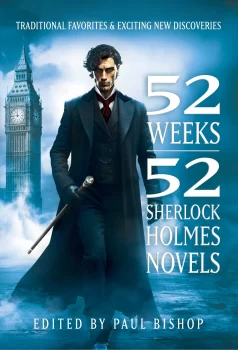 So, Paul Bishop is a friend of mine, and he wrote the very first post in Black Gate’s award-nominated Discovering Robert E. Howard. He talked about Howard’s boxing stories. Before those Pulps dried up, Howard wrote prolifically for them, with Sailor Steve Costigan his most popular creation.
So, Paul Bishop is a friend of mine, and he wrote the very first post in Black Gate’s award-nominated Discovering Robert E. Howard. He talked about Howard’s boxing stories. Before those Pulps dried up, Howard wrote prolifically for them, with Sailor Steve Costigan his most popular creation.
Paul is a major Westerns guy, and with Scott Harris, he put together 52 Weeks: 52 Western Novels, in which a slew of folks wrote about their favorite Westerns. It’s a cool format, and 52 Weeks: 52 Western Movies, and 52 Weeks: 52 TV Westerns, followed. The ’52’ number flows nicely with reading one a week, right? I have read the Novels, and Movies, books, and I think they’re cool for Westerns fans.
Paul reached out to me last year, and asked if I was interested in contributing a chapter to a 52 Weeks: 52 Sherlock Holmes Novels, project. Write about a non-Doyle pastiche? Heck yeah!!! In the end, I wrote four of them, so I’ve got a good 7.6% of the reviews. I covered Hugh Ashton’s The Death of Cardinal Tosca; John Gardner’s The Return of Moriarty; Michael Kurland’s The Infernal Device: and Frank Thomas’ Sherlock Holmes & The Sacred Sword.
We all followed the same format; well, we were supposed to. I know I did. So, to help promote this cool book, which came out last Friday (paperback and digital), here’s the first of the four I wrote. I’ve long been a fan of Kurland’s Moriarty books, and this is where it all started for me with him. Enjoy!
THE INFERNAL DEVICE
Michael Kurland
Published 1978
Contributor – Bob Byrne
BOOK FACTS
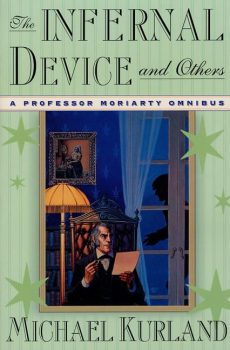 Version 1.0.0
Version 1.0.0
James Moriarty is THE great villain of the Canon. Until financial considerations caused Arthur Conan Doyle to do some revisionist history, Moriarty was the man who killed Sherlock Holmes. The Professor has become a popular character in Holmes pastiches, with novels and entire short story collections dedicated to him.
It’s no surprise that it’s fun to flesh out the character: There are untold possibilities. Elsewhere in this book, I wrote about John Gardner’s The Return of Moriarty, with the professor being a Victorian Era Mafia Don, with a crime family doing his bidding.
Michael Kurland’s Moriarty is a scientist, always looking to solve nature’s mysteries. He undertakes criminal enterprises to pay the bills, as it were. He doesn’t search out crimes – people come to him and he decides whether or not to take on the job. Moriarty isn’t a spider at the center of a web of all London’s crimes, though Sherlock Holmes is (wrongly) obsessed with him. We learn that Moriarty was Holmes’ math tutor, but their different paths set Holmes after him.
The stories are told from the perspective of an American journalist named Barnett, who Moriarty frees from a Turkish prison (he was framed for murder) in exchange for two years of employment. Barnett runs a news service, selling local British and European news to American newspapers. The information he gathers is useful in his role as Moriarty’s assistant.
Holmes unsuccessfully tries to pin a kidnapping on Moriarty, but eventually teams up with him to stop an attempt on the Queen’s life. The ‘infernal device’ is a prototype weapon of destruction, and hot air balloons play a key role. Reminds of me of the recurring theme of ‘The coming thing’ from The Adventures of Brisco County, Jr..
Kurland writes a good Holmes, and his Moriarty is an interesting character. No saint, but not a devil, either. The follow-up novel, Death by Gaslight, is at least as good, and the Moriarty series got off to strong start.
AUTHOR FACTS
Kurland has written five Moriarty books, as well as four novella/short stories. He also wrote two Lord Darcy novels after the original author, Randall Garrett, passed away. Kurland is active on Facebook.
BEYOND THE FACTS
Before the turn of the century, Holmes pastiches were not easily available, like they are now. Self-publishing, and online booksellers, weren’t common. The Doyle Estate had more influence/rights over the Holmes copyright. The Infernal Device (1978) was followed in 1982 by Death by Gaslight. They were hard to find after the initial printing, though. In 2001, Kurland wrote a new short story, “The Paradol Paradox,” and his three Moriarty titles were issued as one book: The Infernal Device and Others (A Professor Moriarty Omnibus). That same year, a new novel, The Great Game, came out. Kurland’s Moriarty stories have been readily available since then.
FUN FACT
One of the great joys of being a Sherlockian is speculating on the ‘untold tales’ which Watson mentions. In “A Scandal in Bohemia,” he tells that Holmes had been summoned to Odessa (Russia) ‘in the case of the Trepoff murder.’ Trepoff is the villain in this first Moriarty tale.
MOVIE FACTS
There have been no on-screen (or radio, that I’m aware of) adaptations of Kurland’s books. Moriarty, of course, has appeared many, many times. Ernest Maupain played the Professor opposite William Gillette’s Holmes when the great actor filmed his famous play, in 1916. I like Eric Porter, in Jeremy Brett’s Granada series. Lyn Harding played the two great villains of the Holmes Canon. He was twice a Moriarty, facing off against Arthur Wontner’s classic Holmes. But before that, on screen and stage, he was the terrible Grimesby Rylott (Raymond Massey, Jeremy Brett’s future father-in-law, was Holmes on screen), in The Speckled Band.
FAVORITE QUOTE
“It’s hard, almost impossible, properly to verbalize the complicated and complex chain of interrelated data that allows a genius to arrive at the correct inductive answer,” Moriarty said.

Bob Byrne’s ‘A (Black) Gat in the Hand’ made its Black Gate debut in 2018 and has returned every summer since.
His ‘The Public Life of Sherlock Holmes’ column ran every Monday morning at Black Gate from March, 2014 through March, 2017. And he irregularly posts on Rex Stout’s gargantuan detective in ‘Nero Wolfe’s Brownstone.’ He is a member of the Praed Street Irregulars, founded www.SolarPons.com (the only website dedicated to the ‘Sherlock Holmes of Praed Street’).
He organized Black Gate’s award-nominated ‘Discovering Robert E. Howard’ series, as well as the award-winning ‘Hither Came Conan’ series. Which is now part of THE Definitive guide to Conan. He also organized 2023’s ‘Talking Tolkien.’
He has contributed stories to The MX Book of New Sherlock Holmes Stories — Parts III, IV, V, VI, XXI, and XXXIII.
He has written introductions for Steeger Books, and appeared in several magazines, including Black Mask, Sherlock Holmes Mystery Magazine, The Strand Magazine, and Sherlock Magazine.
You can definitely ‘experience the Bobness’ at Jason Waltz’s ’24? in 42′ podcast.
Multiverse 8 Snippet 1
Sitrep:
I sent MV8 off to Rea on Monday. She got it back to me yesterday, and I did the edits and then sent it off to Goodlifeguide for final formatting. There are... 5 stories? Two new original science fiction, 2 Federation stories, and 1 PRI story.
We'll see if I get it back before Memorial Day. Fingers crossed.
In other news, I've spent the past week running 8 of my old covers through SeaArt to enhance them. I am wrapping up the last one but I'm torn. I'm not sure if I should go with the enhanced original design or one of Bast.
I'll post the new covers in a later post.
Anyway, on to the snippet!
Normal 0 false false false EN-US X-NONE X-NONE MicrosoftInternetExplorer4 /* Style Definitions */ table.MsoNormalTable {mso-style-name:"Table Normal"; mso-tstyle-rowband-size:0; mso-tstyle-colband-size:0; mso-style-noshow:yes; mso-style-priority:99; mso-style-qformat:yes; mso-style-parent:""; mso-padding-alt:0in 5.4pt 0in 5.4pt; mso-para-margin:0in; mso-para-margin-bottom:.0001pt; mso-pagination:widow-orphan; font-size:10.0pt; font-family:"Times New Roman","serif";}
Invasion
Yep, another alien invasion story. But this one has been kicking around for a while. I think it came up after seeing some of the invasion stories where humanity looses initially? Like Falling Skies and such. Of course, I have to put my own twist on things. :)
Glen Aurellius was out hunting but aware it wasn’t a good time for it. Most of the animals were active at dawn and dusk. But he had to hunt; he only had so much food on him. His backpack was filled with odds and ends to help him survive but was light on fresh food.
He really needed to stop for a while and try to smoke whatever he caught so it would last longer. Either that or trade the excess again or give it up rather than have another survivor try to rob him of it. It wasn’t worth the fight.
He heard some motion in the ferns up ahead and paused. He knelt slowly, feeling the ache in his knees from the motion, but he ignored it as he pulled his bow up and notched an arrow.
The animal that came out of the bush was a feral pig, maybe six months to a year old. It wasn’t very bright; it went for the pile of nuts and berries he’d left out as bait.
He lined up his hunting arrow and made certain he had a solid shot before he let loose. The arrow swished and hit the pig in the shoulder. It squealed in surprise and tried to run but stumbled.
He snapped another arrow up and shot the beast before it got too far. He wasn’t in the mood to chase it. That arrow hit the head though and had a point not a broad head. It didn’t have the power to penetrate the skull. It stuck out like one of those spears used to torment fighting bulls.
He didn’t think of that much as he pulled a third arrow and shot it. That caught the pig in the ass. It stumbled and then fell as its movements and the broad head arrow tore something vital within it. It finally fell gasping into the ferns and dirt.
Glen went over and used his bowie knife to slit the throat as the pig twitched. He didn’t want it to come back to life. He knew he was being stupid; you were supposed to wait until the kill was dead but he didn’t feel safe.
He watched the blood flow as he pulled his arrows and examined them. He flicked a bit of gore off one and frowned at the tip of the second arrow. The metal was okay but the arrow wood behind it had a slight crack. That’s what he got for using a point and not using composite arrows.
He shook his head and cleaned the tip on the bristle hide of the fallen beast. He was going to eat well tonight even though he wasn’t too fond of pork. Oh, bacon was fine, but ham was a bit greasy.
Still, food was food.
He put the arrows in the quiver and set it on top of his pack and the bow and then got to work. He pulled a camping rope out and tossed one end over the tree limb above. He knotted the other around a rear leg and then yanked it up. Once the pig was jacked up, he tied off the rope and gutted it.
He was working fast and dirty, there was no telling what was in the area. A bear, wolverine, big cat, or anything else. The smell of blood would attract other predators soon enough. The flies would get fierce too in the early summer heat.
He flicked a fly away and then began to portion the pig up. It was only eighty pounds or so, sixty with the offal unloaded. He left the head and some of the bones behind. He wrapped the rest in a piece of plastic and then tested it as he got up.
At forty-two he thought he could handle the pack and meat but it was not going to be a pleasant haul. He was going to need to find shelter soon as well as some firewood. Once he was somewhere dependable, he could break the meat down further.
Scavengers were welcome to the leftovers or ex-wives, whichever came first he thought in amusement.
He had been married and divorced twice. He’d been something of a JOAT, bouncing around with careers. He’d never really found his calling. His dreams of being in the military had died when he’d been injured in a football game. From there he’d moved on to a few other career paths. He had loved science fiction though, which was why he’d ended up on the west coast.
Now he was trying to make it back to the east coast to the old family farm, if it even existed. Picking his way on foot was a bitch though. There were no vehicles running; anyone stupid enough to get one going usually ended up as target practice for the bastards in orbit.
Involuntarily, he glanced to the sky. It was not quite noon; he had plenty of time to find shelter.
He heard a commotion ahead of him and instinctively paused and then turned. He wasn’t certain what it was but he didn’t want to encounter it with so much weight and his primary weapons locked down behind him. At the moment, he had his machete and knife available.
He walked around a big tree but then paused and slowly put his hands up at the sight of an alien Centaur standing there holding a rifle. A human in camo was standing next to him.
“Well, what do we have here?” the guy said. “I didn’t know we ordered take out, but I think we’ll take it to go,” the guy said.
Glen had a sinking heart. The sounds of something moving in the brush intensified. He turned his head slightly and saw another Centaur charge up and then stop. It snorted at him. It was holding a rifle in its arms casually.
“Um, hi, guys?” Glen said.
The other human snorted. “I believe lunch is served,” he said as he indicated that Glen should unload.
Glen sighed and hoped it was just a robbery.
~~~*~~~
Belated Movie Review #9: Corey Feldman’s The Birthday
The Birthday (Arcadia Motion Pictures, November 10, 2006)
What are you doing right now? Whatever it is, stop it. Stop it and watch the Corey Feldmen vehicle The Birthday. Watch it. Right! Damn! Now!
“Woah, Simmons,” you may be saying to yourself. “Where’s the fire? What’s the rush?”
The rush is twofold. Fold First — while this is a belated movie review, it isn’t my fault that it is so late! We are lucky that this move is viewable at all. Forces, dark forces, have tried to keep The Birthday down, to keep you, the peoples, from seeing it.
Second Fold. How can I say this… I’m a man of a certain age, I don’t usually get fired up about movies anymore. Some of my generation get bees in their bonnets and burrs ‘neath their saddles with remakes and reboots and whatever. Myself? I have a very zen-like attitude toward the whole thing. Hollywood made movies for me for like 40 years. It would be poor form to ask for more.
That said, in the early 90s it seemed that Hollywood was pulling movies straight from my subconscious. Robert Sarandon starring in The Resurrected, and the Fred Ward powerhouse To Cast A Deadly Spell. The former being a stab at filming Lovecraft’s “The Case of Charles Dexter Ward,” the second a Lovecraftian 40s noir comedy — yes, please! And I’m not casting any shade at its sequel, Dennis Hopper and Julian Sands’ Witchhunt. My friends, Tremors was like putting a quarter in a slot machine and winning $100!
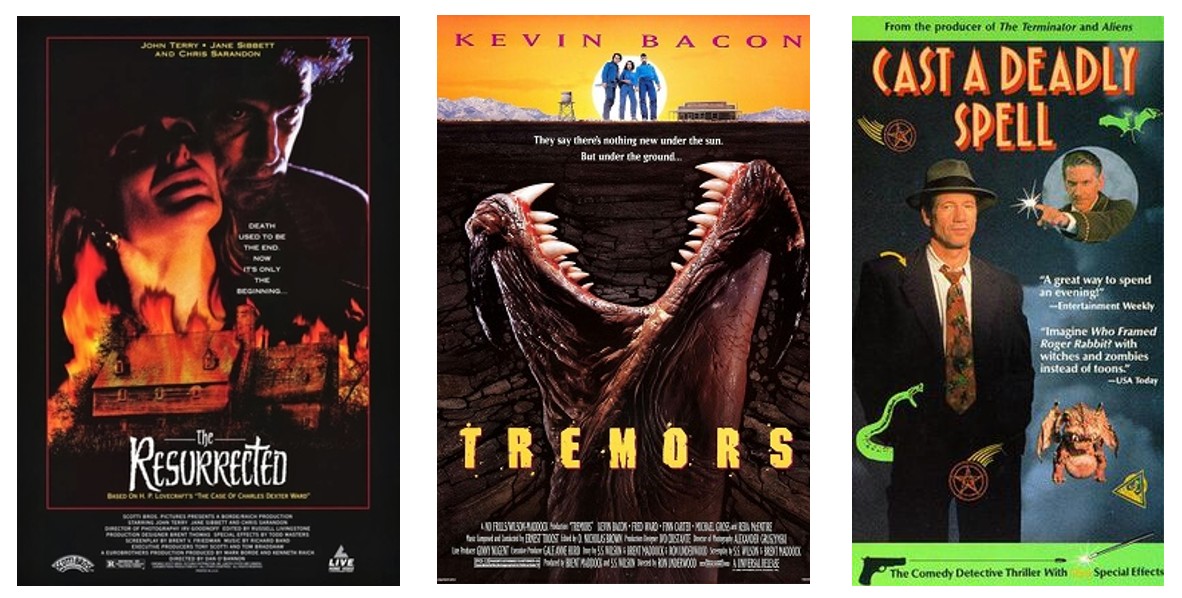 Another Holy Trinity!
Another Holy Trinity!
The Birthday falls into that kind of thing. A guy walks into the wrong damn place at the wrong damn time and things spiral out of hand. Way out of hand.
Feldman’s Norman Forrest is a decent guy, but he’s a schlub: nervous, nasal-y, and he’s trying his best to put on a brave face at his girlfriend’s father’s birthday party. These are not his people; they are wealthy (her father owns a string of hotels — including the venue for the party), his girlfriend has just gotten back from a trip to Europe — a long one it would appear.
Norman is trying to make his feelings for her known, but he’s constantly getting sidetracked. Last minute party issues, the fact some of his high school friends are having a corporate party on another floor, and then, well, there is something really weird going on in the background of the hotel. The wait staff, the cooks, something, several somethings, are going on.
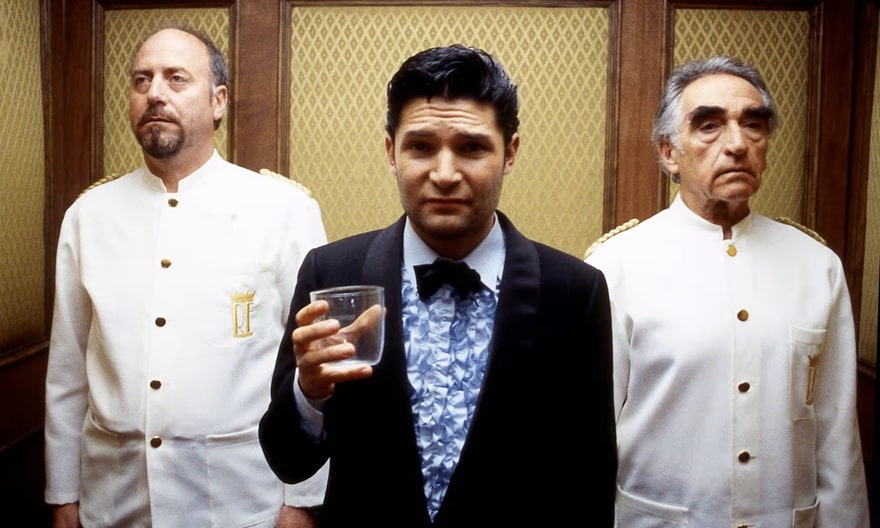 There’s something weird going on in the hotel
There’s something weird going on in the hotel
Cults? Secret Agencies? Murder in the sub-basement? A hero needs to step forth, and lord help us, the only guy who even matches that description is certainly not Norman Forrest. The hero that steps forth is Theodore, who claims to a secret agent, the point of the spear of a… well, a counter-cult maybe? But he can’t do much on his own and Lord help us, the only person he can rely on is Norman Forrest. But then, Theodore may be so crazy that in reality he’s the real threat.
Norman is a lot of things, but he’s not a fool. He’s open minded enough to ask questions, but not so open-minded that his brain’s gonna fall out, or that he’s going to let someone fill it with nonsense. But he’s in one of those situations where, by the time you get the proof you really need, it may well be too late.
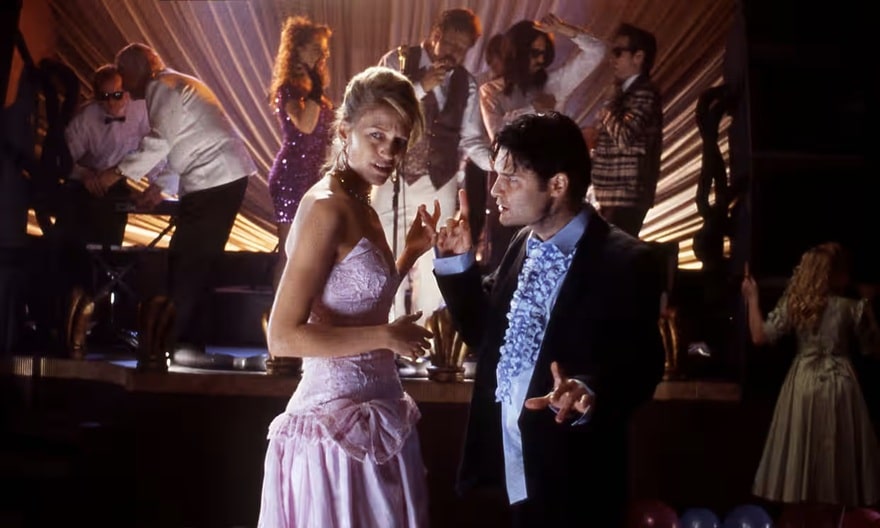 Erica Prior and Corey Feldman in The Birthday
Erica Prior and Corey Feldman in The Birthday
I only heard about the movie because one of my lefty-liberal websites had an interview with Feldman discussing it:
That is what that experience is with Norman. He has his high school buddy [Vince] around and he remembers being a kid and talking about girls in the locker room. There was a time when Norman wasn’t so neurotic. But maybe he also felt he wasn’t the best athlete and didn’t fit in because he didn’t like taking a shower with all the guys. I put him back in his school days whenever he interacted with his friend Vince. Juxtaposing that with this Indiana Jones character, Theodore, who may be a kook or savior. Is Theodore out of his mind and wandering in here with this fantasy, or is he really there because there is something going on, and this is Norman’s calling? Is Norman going to warn everyone there’s a crazy person running around the hotel, or is he going to believe this guy and take his gun and go on this adventure too? There is a whole side Norman develops that he didn’t know existed.
The movie is claustrophobic and at times muddy, but then if you’ve ever been stuck in a building with multiple parties and conflicting goals, you know that it can feel tight and muddled.
Check it out!
Adrian Simmons is an editor for Heroic Fantasy Quarterly, check out their Best-of Volume 4 Anthology, or support them on Patreon!
“The Ashtrays are Full and the Glasses are Empty” by Kirsten Mickelwait
The Ashtrays are Full and the Glasses are Empty is a star-studded novel based on…
The post “The Ashtrays are Full and the Glasses are Empty” by Kirsten Mickelwait appeared first on LitStack.
Tubi Dive, Part VI
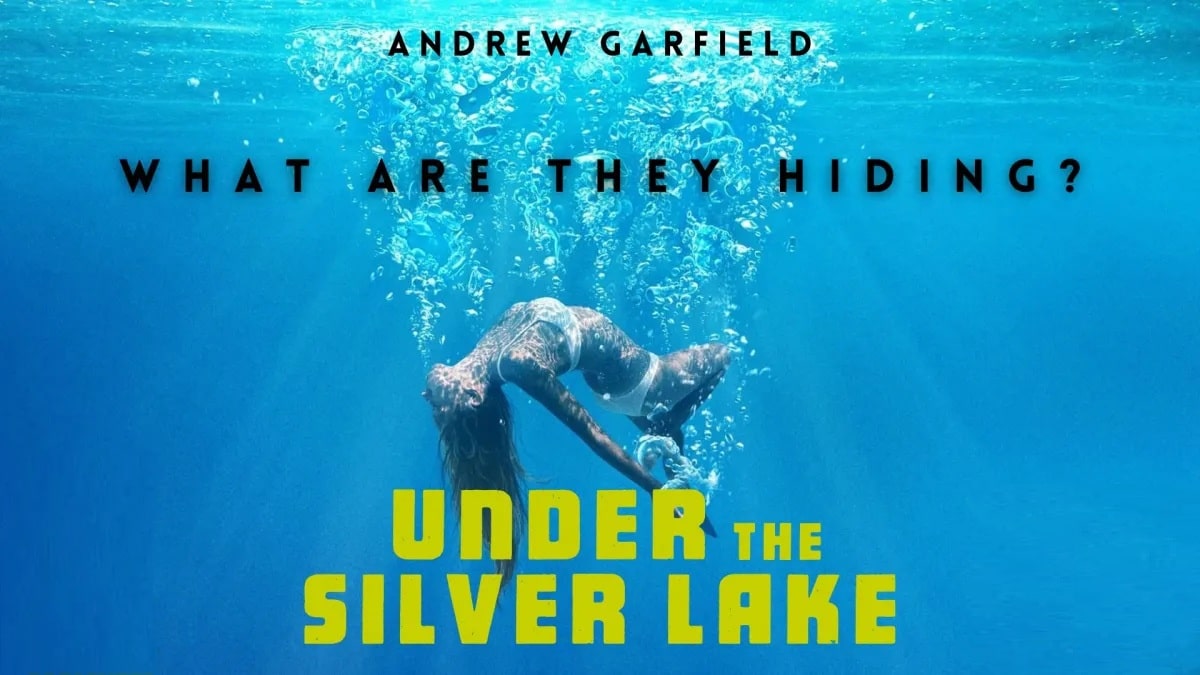 Under the Silver Lake (A24, April 19, 2019)
Under the Silver Lake (A24, April 19, 2019)
50 films that I dug up on Tubi.
Enjoy!
Under the Silver Lake (2018)Just in case you’re getting the wrong impression, Tubi isn’t all hidden schlock from around the world, there’s actually some proper* movies on there too.
Under the Silver Lake is the follow-up film from It Follows director David Robert Mitchell, and it seems the suits loved his horror film so much that they gave him free rein to do whatever he wanted to do.
What Mitchell wanted to do was make a two-hour, surreal, ‘slacker-noir’ type mystery film, with plenty of sex, violence, conspiracy theories and Andrew Garfield’s bottom.
I’m acutely aware that this is one of those films that sharply divides its audience. Some will bemoan the two hours they just lost on something they don’t understand, while others will wallow in its dreamlike narrative and unhinged tangents. I loved it.
Garfield plays a 30-something man who sits around doing nothing except smoke and watch his topless neighbour feed her parrots. When he falls for another neighbour his life is turned upside down, and leads him on a wild trail of hobo codes, murder, mysterious maps, secret codes, the truth behind pop culture, an urban legend, and a possible dog killer. Garfield is excellent as he drifts in and out of every scenario, looking increasingly worn down with each new revelation, and the supporting cast (mostly made up of attractive women there to feed his pervy addictions) are all great.
This was one of those films that drew me in and carried me along — I’ve seen comparisons to Mulholland Drive, but for me it felt like watching Mystery Train or Exotica for the first time.
Wonderful stuff.
10/10
*Proper to some. Everything I watch on there is proper.
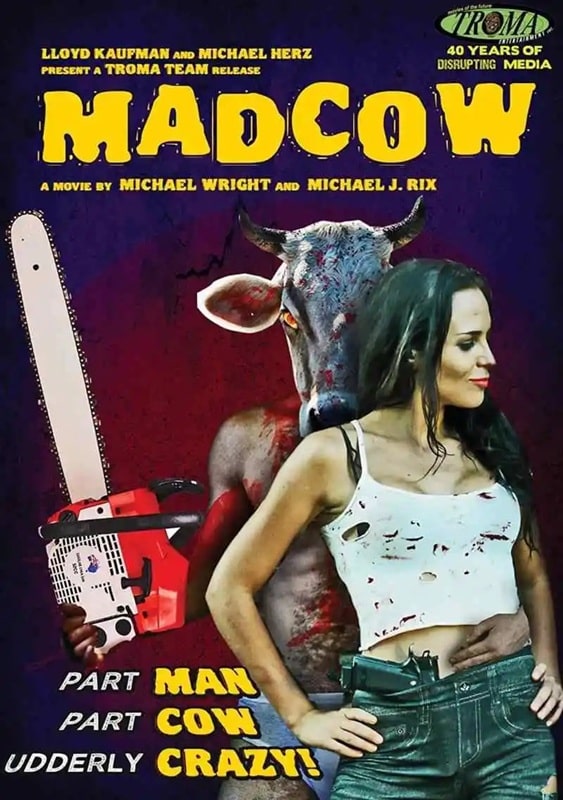
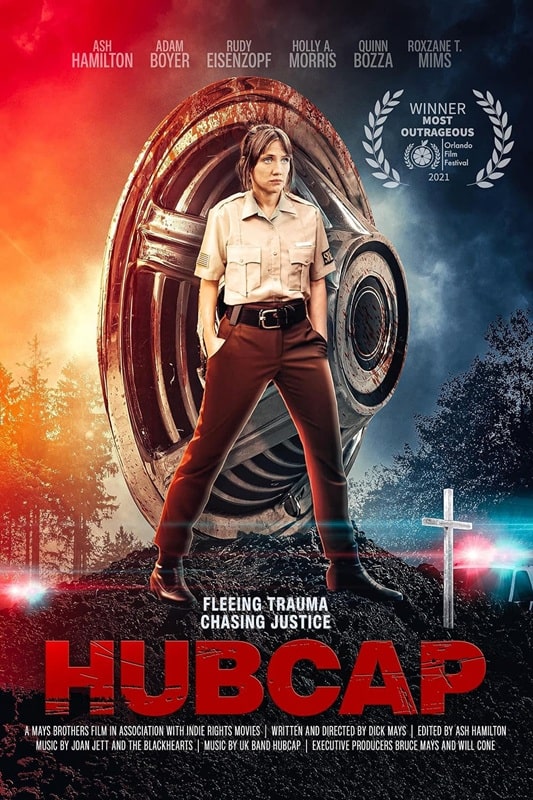
Mad Cow (Troma Entertainment, 2010) and Hubcap (Hubcap Film, 2021)
Watched a couple of sensible films recently, so I had to find a palate cleanser, and a Troma film usually does the trick.
Not strictly a Troma production (this was made by Funny How Films), Mad Cow was shot on a shoestring budget in 12 days (it shows), and is billed as more of a comedy than a horror film.
The story, for what it’s worth, concerns a scientist who transplants a cow’s head onto a human body. Said beastie then grabs a chainsaw and hilarity ensues. Actually, no it doesn’t. The deeply self-referential script is childish at best, deeply homophobic at worst, and I think I laughed twice at the Zucker Brothers-lite attempt at humor.
The funniest part might have been when I recognized most of the music as being stuff I had used myself for my student films, and when Kevin MacLeod’s name popped up in the end credits the film got a third titter out of me. So well done, I guess?
4/10
Hubcap (2021)Hoping for a spiritual successor to Quentin Dupieux’s Rubber (which I love), I settled down for this slice of road rage, and soon got, ahem, tired.
It’s a story of abusive relationships, PTSD, and political shenanigans, all tied together by a sentient hubcap possessed by the vengeful spirit of a war veteran.
What could have been highly silly, and somewhat enjoyable, becomes a bit of a slog from the midpoint once the main baddie has been dispatched and the hubcap stops its killing spree.
Oh well, plenty more fish* in the sea**.
4/10
* daft and gory films
** on Tubi
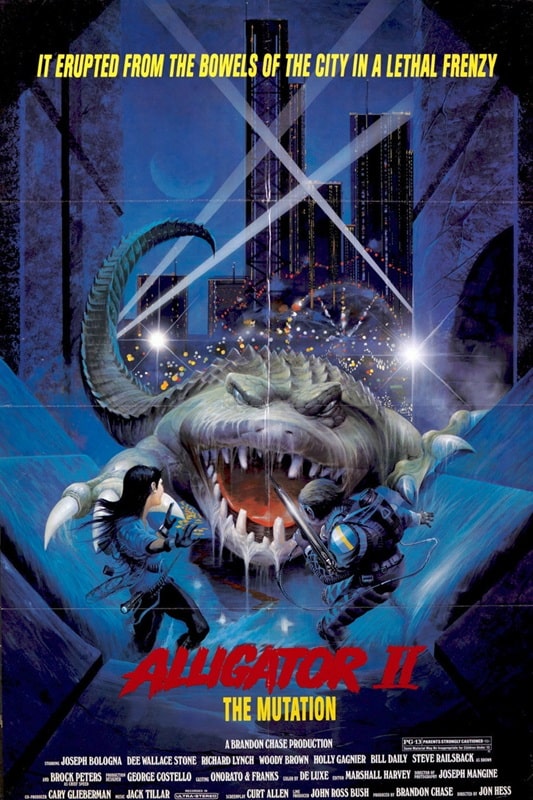

Alligator 2: The Mutation (New Line Cinema, June 5, 1991) and Vampire Clay (King Records, 2017)
Now then, I made a soft and slow rule that all the films I do these rubbish reviews for are first time watches, and yet I really think I’ve seen this one before. However, all I have is a sketchy memory of Richard Lynch in an underground alligator nest, so I can only assume that I caught a snippet one day on TV, or was very drunk at the time. Either way, here we are.
The first Alligator is awesome, but this one comes nowhere near to recapturing that magic. Instead we get another Jaws rehash with one-dimensional characters and dull kills. Joe Bologna is fine as the spiky detective who ain’t gonna follow the rules, but he’s no Robert Forster, and it’s fun to see Dee Wallace and Steve Railsback. The titular beastie is hardly a mutation though (just larger than normal).
They keep it light-hearted and there’s a couple of fun set pieces, but on the whole it’s a bit soggy.
5/10
Vampire Clay (2017)This is the feature-length debut of Sôichi Umezawa, who was responsible for the stop-motion insanity that was ‘Y’ in The ABCs of Death, so naturally I was quite excited.
The premise is great — a lump of clay is possessed by a disgruntled artist, which then goes on a blood-sucking spree when resurrected by an art student. The clay just needs moisture, any moisture, to reconstitute itself, and it dispatches art students and a hamster in a variety of slippery ways. Lurking in the background of this nuttiness is a commentary on modern art attitudes, a smattering of jealousy, and a dash of redemption, but we didn’t come here for drama and lectures. We came here for vampire clay.
Unfortunately, Umezawa is a way better short-form director, because this was unforgivably dull. The animatronic rubber and stop-mo effects were plentiful, but lit and shot so badly that they had no real impact, which was a pity. He does allow himself a gloopy animated sequence at the end (which really reminded me of a film I made about earwax a while ago), and the final clay creature is terrifyingly cute, but I was ultimately a little disappointed at what might have been. Oh well.
5/10
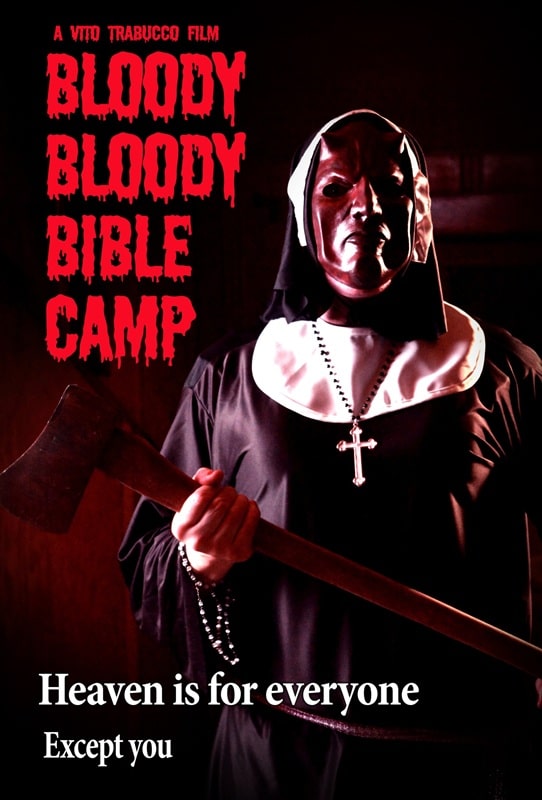
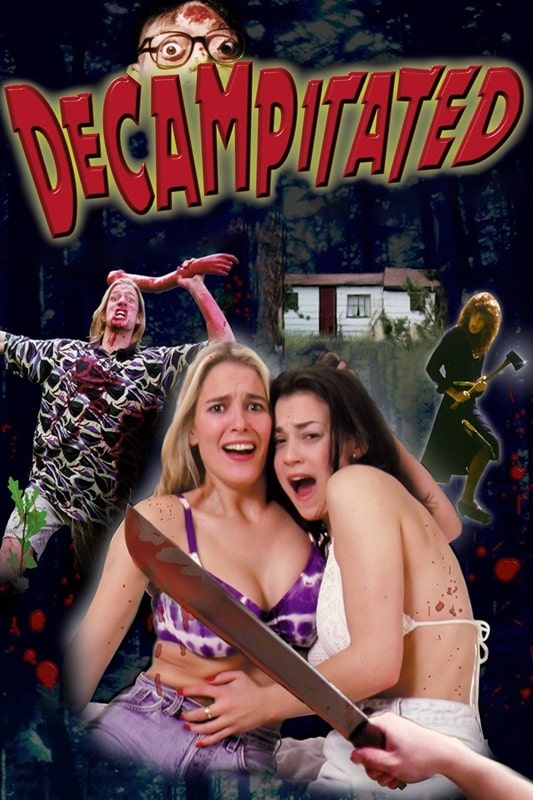
Bloody Bloody Bible Camp (Maltauro Entertainment, May 5, 2012) and
Decampitated (Troma Entertainment, 1998)
It’s 1977 (we know this because the characters are talking about Star Wars, Smokey and the Bandit, and the death of Elvis, all while sporting mustaches and/or short shorts), and the horniest bunch of Christians to ever walk God’s green earth are figuring out how to shag each other without upsetting the big man. Luckily, all this tediousness is put to a stop by a killer nun with a dagger crucifix.
Flash forward to 1984, and a new group of horny Christians are on their way to the same camp, led by ‘Father Cummings’, played by Phantasm‘s Reggie Bannister with some seriously dyed hair. As his name suggests, this isn’t as high-brow as you might expect (the mad nun’s name is Sister Chopper), and the filmmakers not only managed to adhere to the fodder-tropes for the characters, but also managed to make them hugely unlikeable.
There’s actually the germ of a decent slasher movie lost in here, but it is squandered in a maelstrom of unfunny dick jokes and a smorgasbord of hugely offensive moments, ranging from homophobic and transvestite ‘gags’, to anti-Semitism and sexual abuse. A shame really, as this has a fun (if a little hackneyed) premise. By the way, Ron Jeremy plays Jesus. JFC.
4/10
Decampitated (1998)Keeping with the campsite slasher theme, I decided to take a look at another Troma-backed effort, this one directed by Matt Cunningham. I thought I knew what I was in for after the excellent opening (but I was wrong).
The film starts with a woman fleeing for her life through the woods as she is pursued by a hunter wearing an apiary hood. She steps on a bear trap and saws her own foot off to hobble on her way. Then she steps on another trap and cuts the other foot off before dragging herself through the trees. Unfortunately, she puts her hand in a third trap and saws that off too. When her last limb is trapped, the hunter catches up to her and finishes her off. It’s absurd, mean and played for laughs, and I thought the tone would remain the same.
Sadly, the resulting film (unlikeable youths crash car, try to survive hunter) is so desperately unfunny, horribly shot (an over-reliance on fish-eye lenses) and horrendously over-acted in an effort to be ‘wacky’, that the whole thing soon becomes a chore. Plus, for the second film in a row, there is some major transvestite-bashing going on — what’s with these films? A smattering of fun, practical gore, but nothing to recommend.
4/10
Previous Murkey Movie surveys from Neil Baker include:
Tubi Dive, Part I
Tubi Dive, Part II
Tubi Dive, Part III
Tubi Dive, Part IV
Tubi Dive, Part V
What Possessed You?
Fan of the Cave Bear
There, Wolves
What a Croc
Prehistrionics
Jumping the Shark
Alien Overlords
Biggus Footus
I Like Big Bugs and I Cannot Lie
The Weird, Weird West
Warrior Women Watch-a-thon
Neil Baker’s last article for us was Part V of Tubi Dive. Neil spends his days watching dodgy movies, most of them terrible, in the hope that you might be inspired to watch them too. He is often asked why he doesn’t watch ‘proper’ films, and he honestly doesn’t have a good answer. He is an author, illustrator, teacher, and sculptor of turtle exhibits. (AprilMoonBooks.com).
Querying Writers: 14 Indispensable Resources For Success
For querying writers hoping to publish that first book, the challenge of querying for representation…
The post Querying Writers: 14 Indispensable Resources For Success appeared first on LitStack.
Virtual Sci-Fi/Fantasy Book Recommendations Event Video
If you missed the first quarterly Sci-Fi/Fantasy Book Recommendations event with the Ashland Public Library last night, you can catch the video on Youtube. This included discussion of the following books: The Changeling Sea by Patricia A. McKillip Warchild by Karin Lowachee The Raven Scholar by Antonia Hodgson The Jasad Heir by Sara Hashem Seed to Harvest by Octavia E. Butler These are quarterly half-hour long discussions taking place on Zoom on the third Thursday of the month, and the […]
The post Virtual Sci-Fi/Fantasy Book Recommendations Event Video first appeared on Fantasy Cafe.The Inheritance: Chapter 5 Part 3
The rollercoaster note is still in effect: this will be a scary ride, but it will arrive safely. Ada is not a pushover.
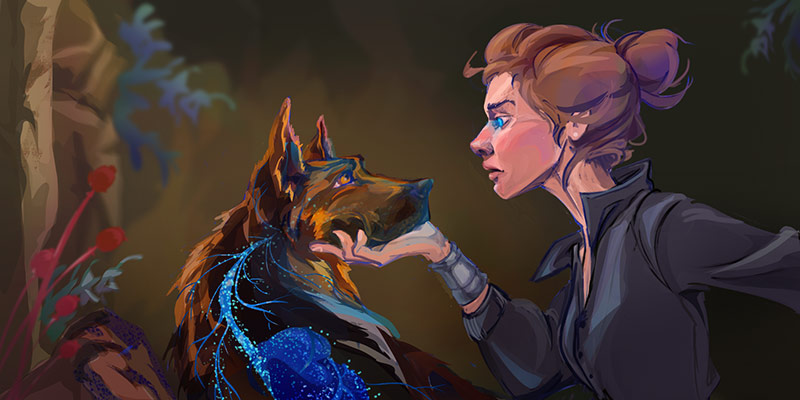
Something was wrong with Bear.
We had cut our way through the stalker tunnels. Our trail was littered with corpses, and we had just killed our fifteenth beast. It hadn’t gotten easier, not at all. I was so worn down, I could barely move. My body hurt, the ache spreading through the muscles like a disease, sapping my new strength and making me slow.
Bear stumbled again. I thought it was fatigue at first, but we had rested for a few minutes before this last fight, and it hadn’t helped at all. I had kept her from serious injury. She’d been clawed and bitten once, but the bite had been shallow, so it likely wasn’t the blood loss.
Bear whined and fell.
Oh god.
I dropped on my knees by her. “What is it?”
The shepherd looked up at me, her eyes puzzled and trusting.
I flexed, focusing on her body, concentrating all of my power on her. What was it? Blood loss, infection…
The faint outline of Bear’s body glowed with pale green, which told me nothing. I had to push deeper. I focused my power into a thin scalpel and used it to slice through the surface glow.
It resisted.
I sliced harder.
Harder!
It broke, splintering vertically into layers, and I punched through it. It was almost like falling through the floor to a lower level.
Bear’s body lit up with pale blue, the glow tracing her nerves, her blood vessels, and her organs. I had never before been able to do that, but that didn’t matter now.
Toxin. She was filled with it. I saw it, tiny flecks glowing brighter as they coursed through her like some deadly glitter. I had to find the origin of it. Was it from a stalker bite? No, the concentration of poison wasn’t dense there. Then what was it? Where was it the highest?
Her lungs. That fucking glitter saturated her lungs, slipping into her bloodstream with every breath. I had to go deeper. I pushed with my power. Before, it was like trying to slice through glass. Now it felt like punching through solid rock, and I hammered at it.
The top layer of the blue glow cracked, revealing a slightly different shade of blue underneath. I hit it again and again, locked onto the glitter with every drop of willpower I had.
The tiny specks expanded into spheres. What the hell was that?
I pounded on the glow, trying to enlarge it. The spheres came into greater focus. They weren’t uniformly round; they had four lobes clumped together and studded with spikes.
What are you? Where did you come from?
A flash of white cut my vision. I went blind. It lasted only a moment, but I knew I hit a wall. I wasn’t going any deeper. I would have to work at this level.
I blinked, trying to reacquire my vision.
My thighs were glowing with blue.
I jerked my hands up. Pale glitter swirling through my arms and fingers. This dust, this thing was inside me too, and I couldn’t identify it.
We were both infected, and it was killing us.
Panic drenched me in icy sweat. I wanted to rip a hole in my legs and just force the glitter out.
Bear whined softly like a puppy.
I was losing her. She trusted me, she followed me, and she fought with me, and now she was dying.
“You can’t die, Bear. Hold on. Please hold on for me.”
Bear licked my hand.
The urge to scream my head off gripped me. Wailing wouldn’t help. If only I could identify the poison.
Why couldn’t I identify it? Was it because it was inside us and it had become part of us? Or was I just not strong enough to differentiate it from our blood? It had started in the lungs, so we must have inhaled it.
I took a deep breath and exhaled on my hands.
There it was! A trace of the lethal glitter. I focused on it. The four-lobes spiked clumps, swirling, swirling… Something inside me connected, and I saw a faint image in my mind. The mauve flowers. We had been poisoned by their pollen.
I flexed harder, stabbing at the pollen with my talent. The tiny flecks opened up into a layered picture in my mind, and the top layer showed how toxic it was…
Oh god.
We were almost out of time. We needed an antidote. Now.
I strained, trying to access whatever power lay inside me, the same one that showed me the Grasping Hand and gave me the stalkers’ name. It didn’t answer.
Please. Please help me.
Nothing.
We would die right here, in this tunnel. I knew it, I could picture it, me wrapped around Bear, hugging her as we both grew cold…
No. There had to be an answer. We hadn’t come all this way to lay down and die. We did not kill and fight all these damn stalkers –
The stalkers. The stalkers went to the lake to drink. The flowers were all over the shore, but the stalkers had died because the lake dragon had torn them apart. The flowers didn’t poison them.
I jumped to my feet and ran to the nearest corpse. My talent reached out and grasped the body. There was pollen on the fur and on the muzzle and a faint smudge in the lungs, but none anywhere else. Not a trace in the blood. They were immune.
The poison had to be eliminated in the bloodstream. If it was purged in the liver or any other organ, there would’ve been traces of it in the blood vessels but there were none.
I flipped the stalker on its back, shaped my sword into a knife, and stabbed the corpse, slicing it from the neck to the groin. Bloody wet innards spilled out. I dug in the mush, pushing slippery tissue aside until I found the hard sack of the heart. I carved it out and pulled the bloody clump free.
Flex.
The heart glowed with blue. Toxic. It would poison us, too, but there was a slim chance we could make it. It was the difference of might-be-dead from the stalker heart or definitely-dead from the pollen. We didn’t have hours, we had minutes. The heart had to be the answer.
I put it on a flat rock and minced the tough muscle into near mush. I scooped a handful of the bloody mess and staggered over to Bear.
She was still breathing. There was still a chance.
I pried her jaws open and shoved a clump of the stalker mince into her throat. She gulped and gagged. I held her mouth closed.
“Swallow, please swallow…”
Bear gulped again. Yes. It went down.
“What a good girl. The best girl. One more time. Let’s get a little more in there.”
I forced two more handfuls into her and flexed. The concentration of pollen in her stomach dimmed. I had no idea if the immune agent in the stalker blood would spread or if it would be broken down by stomach acid. It didn’t matter. We were all out of choices.
Bear let out a soft, weak howl, almost a gasp. It must have hurt.
“I’m so sorry. I wouldn’t hurt you if there was any other way.”
If I ate the heart now, there was no telling what it would do to me. I could pass out right here, and we would both become stalker dinner.
About twenty minutes ago we had walked by a narrow stone bridge that spanned a deep cavern. There had been a depression at the other end, a little cave within the cave. I’d thought it would be a good place to rest, because the stalkers could only come at us one by one, but I had wanted to get out of the tunnels. At the time, it seemed better to just keep moving. It seemed like forever ago, but it had just happened. We had to find a place to hide, and that was the closest safe spot I could think.
I should be able to find the bridge again. I just had to follow the trail of bodies and make it there before the poison got me.
I picked Bear up. She felt so heavy, impossibly heavy.
I spun around and trudged back the way we came.
The post The Inheritance: Chapter 5 Part 3 first appeared on ILONA ANDREWS.
Tor Doubles #6: Barry B. Longyear’s Enemy Mine and John Kessel’s Another Orphan
 Cover for Enemy Mine by Maren
Cover for Enemy Mine by MarenCover for Another Orphan by Tom Kidd
The sixth Tor Double not only includes the two title stories, Barry B. Longyear’s Enemy Mine and John Kessel’s Another Orphan, but also includes an excerpt from Gwyneth Jones’s novel Divine Endurance. Divine Endurance was originally published in Britain in 1984 and in the U.S. as a hardcover by Arbor House in 1987. Tor was scheduled to publish a paperback edition of the novel in May of 1989, two months after this Tor Double hit the shelves. With the two title stories totaling only 158 pages, the decision was made to add a twenty page excerpt of the forthcoming novel.
Enemy Mine was originally published in Isaac Asimov’s Science Fiction Magazine in September, 1979. It won the Hugo Award and the Nebula Award, as well as the Locus poll. Enemy Mine kicked off Longyear’s “Dracon” series and was the basis for the 1985 film Enemy Mine, starring Dennis Quaid and Louis Gossett, Jr.
The year after the initial publication and success of Enemy Mine, Longyear published an extended version of the story, which has generally superseded the version that won the Hugo and Nebula Award. It is this revised version that is included in this volume.
Enemy Mine is set during a war between humans and the lizard-like Drac, both of whom see the other race as trying to impinge on their own nascent interstellar hegemonies. It is clear from the beginning that there is little communication between the races and the war has been taking place for quite some time and there is no end in sight.
When the novella begins, a human, Willis Davidge, and a Drac, Jeriba Shigan, have crashed on the planet Fyrine IV while a battle rages on in orbit above them. Seeing each other as alien and enemies, they continue in their attempts to kill each other, until they realize that the inhospitable nature of the planet means they have to work together in order to survive.
Over the course of a year, Jeriba and Davidge begin to understand each other and learn each other’s language. Jeriba taught Davidge about the Talman, the closest thing the Drac have to a religious text, as well as about their culture. The Drac are hermaphroditic and when Jeriba explains that it is expecting, the teaching opens up to the ancestor respect the Drac have for their hereditary line.
Had Longyear ended the story with the two enemies coming to terms with each other, and it is clear that Jeriba is more open to the idea of learning about humans than Davidge is with learning about the Drac, Enemy Mine would have been a typical science fiction story. However, the fact that Jeriba is expecting adds a twist to the story that elevates it.
When Jeriba dies in childbirth, it is up to Davidge to raise its child, Zammis, and protect it from the elements. Davidge does this to the best of his abilities, creating a person who is a mix of human and Drac philosophies and who loves the dangerous world upon which it was raised, even as Davidge continues to only see the dangers of Fyrine IV.
Eventually, rescue comes and Davidge finds himself back on an Earth following an armistice with the Drac. Trying to find work and living with his parents, he suffers the sort of disorientation many former soldiers find and is not fully able to fit into his society. When he realizes that despite the truce with the Drac, humans are still as prejudiced against the Drac as they had been during the war, Dravidge decides to attempt to rectify that by translating the Talman into English, although his primary goal is to earn enough money to travel to the Drac homeworld to see Zammis.
While Dravidge’s time with Jeriba and Zammis had taught him about the Drac and the philosophy espoused by the Talman, it gave him a very specific view of the Drac, specifically Jeriba’s own interpretation of Drac culture and philosophy. Upon his arrival at Draco, he learns that their society is every bit as complex and narrow minded as human society. His initial meeting with Jeriba’s father, Gothig, does not go at all as he expects and he learns that the Drac authorities can not be trusted to do the right thing.
Desptie the moment of truce following Dravidge’s rescue, it becomes clear that it is a temporary thing in Longyear’s world. The racial tensions and prejudices of the humans and Drac may be overcome on an individual basis, but they cannot be address on a societal level unless a new society, built apart from mainstream humanity or Drac culture, is allowed to be built.
Although Enemy Mine offers a roadmap to break the cycle of hatred, it does so with an understanding that it can only be done by disregarding the majority of people who may not be able to put aside the slights and atrocities, real or perceived, committed in the past.
I previously discussed Enemy Mine on September 3, 2019 as part of the “Golden Age of Science Fiction” series.
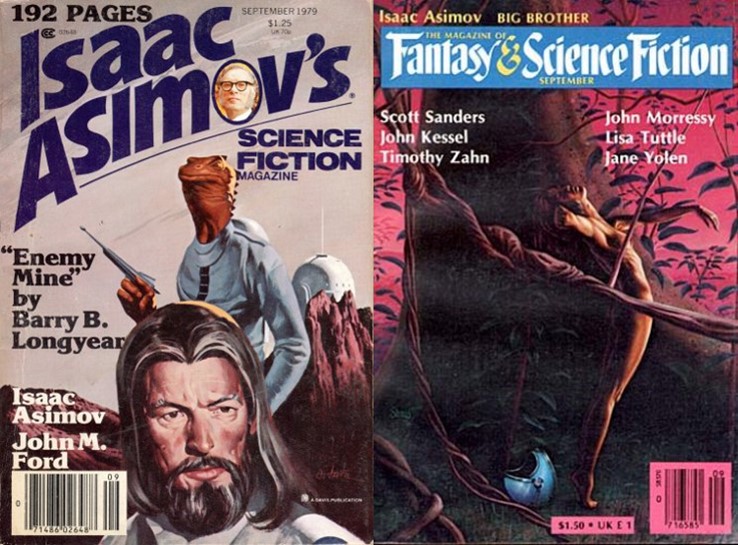 Isaac Asimov’s Science Fiction Magazine 9/79 cover by Vincent di Fate
Isaac Asimov’s Science Fiction Magazine 9/79 cover by Vincent di FateFantasy and Science Fiction 9/82 cover by Barclay Shaw
Another Orphan was originally published in F&SF in September, 1982. It was nominated for the Hugo Award and the Nebula Award, winning the latter.
Patrick Fallon has become unstuck in time, well, perhaps not, but there is a certain feel that he has given that he wakes up one morning and instead of finding himself working at the Chicago Mercantile Exchange he is on a sailing ship, with no memories of how he got there, but clear memories of his life in Chicago and his recent argument with his girlfriend, Carol.
However, Fallon belongs on the ship. The other sailors accept him and know his name. If they question his lack of knowledge of how do the he most basic tasks on the ship, they ignore their doubts, figuring he’ll work his way through it. And he does, with a small amount of help from shipmate Bulkington.
As he begins to figure out how to handle tasks, life on board the ships begins to gain a familiarity to Fallon, but not because he remembers life on the ship. Instead he begins to realize that he hasn’t slipped through time, but instead has slipped through realities, finding himself aboard the whaling ship Pequod, as described in Herman Melville’s Moby Dick.
Having read Moby Dick, Fallon knows that in the end the ship and its crew are doomed with the exception of Ishmael, who he can’t find among the crew. Although he entertains the idea that he may be fulfilling Ishmael’s role, Fallon decides he can’t rely on that hope for survival. After talking with Ahab and learning how much the captain is focused on killing his white whale, Fallon decides he needs to take matters into his own hands.
Fallon talks to other crewmen, including Starbuck, Stubbs, and Bulkington, trying to get them all to understand that Ahab’s focus threatens them all. While they may agree with Fallon, they also understand their place aboard the ship and can’t fathom the idea of mutiny, which is the only way to accomplish the action Fallon is calling for.
Even as he acclimatizes to life on board the Pequod, Fallon recalls his life in Chicago and yearns to return to the comfort and safety of life as a trader. His wife appears to be granted when he suddenly finds himself back in Chicago, preparing for a day of work, and finding that he is as lost there as he was when he first awoke on the Pequod. However, His two lives bleed into each other and Fallon realizes that whether he is in Chicago or the Pequod, the crew he has been living with are moving toward the inexorable climax of the novel which seemingly means Fallon’s death as well as the rest of the crew, with the exception of the enigmatic and undiscovered Ishmael.
Kessel appears to be having fun torturing his main character and the reader by showing them the parallels between the Pequod of Moby Dick and the Pequod of Another Orphan. Because the novel was written by Melville 130 years before Kessel’s story, the events of the story would seem to be set, but Kessel subverts that with the ideas, put forth by both Fallon and Ahab, that events can be fluid and are not predestined. While Fallon is hopeful that the destiny he sees can be averted, Ahab sees an outcome that involves the death of Moby Dick, but doesn’t necessarily mean the destruction of his ship or crew, and until that occurs, the results are undecided.
Fallon’s story is not neatly wrapped up. The final encounter with the whale is still in his future and Ahab is still his captain. Their future has not yet been written, but Kessel leaves them with a sense of dread that they won’t be able to avert the ending Melville has written for them and Fallon may never be able to turn his back on the Pequod and return to his life in Chicgao.
The cover for Another Orphan was painted by Tom Kidd. The cover for Enemy Mine was painted by Maren.
 Steven H Silver is a twenty-one-time Hugo Award nominee and was the publisher of the Hugo-nominated fanzine Argentus as well as the editor and publisher of ISFiC Press for eight years. He has also edited books for DAW, NESFA Press, and ZNB. His most recent anthology is Alternate Peace and his novel After Hastings was published in 2020. Steven has chaired the first Midwest Construction, Windycon three times, and the SFWA Nebula Conference numerous times. He was programming chair for Chicon 2000 and Vice Chair of Chicon 7.
Steven H Silver is a twenty-one-time Hugo Award nominee and was the publisher of the Hugo-nominated fanzine Argentus as well as the editor and publisher of ISFiC Press for eight years. He has also edited books for DAW, NESFA Press, and ZNB. His most recent anthology is Alternate Peace and his novel After Hastings was published in 2020. Steven has chaired the first Midwest Construction, Windycon three times, and the SFWA Nebula Conference numerous times. He was programming chair for Chicon 2000 and Vice Chair of Chicon 7.
Goth Chick News: Oh Deer – Bambi Goes Berserk in The Reckoning
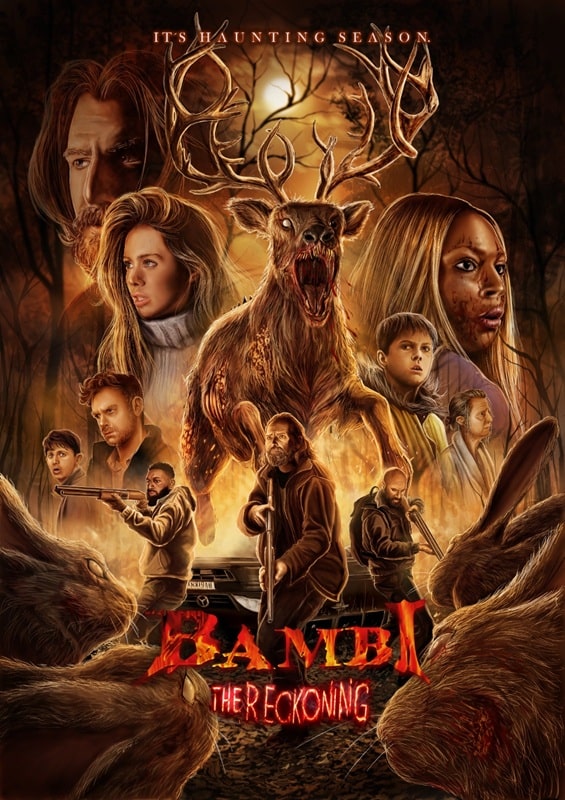 Bambi: The Reckoning (ITN Studio, July 25, 2025)
Bambi: The Reckoning (ITN Studio, July 25, 2025)
File this one in the “Why the F?” folder.
Bambi: The Reckoning is a British indie horror flick directed by Dan Allen and written by Rhys Warrington. It marks the fourth disturbing entry in The Twisted Childhood Universe (TCU), which brought us Winnie-the-Pooh: Blood and Honey and is now turning Felix Salten’s beloved deer into a forest-dwelling force of vengeance.
The Brits must really hate us.
Starring Roxanne McKee, Tom Mulheron, Nicola Wright, Samira Mighty, Alex Cooke, and Russell Geoffrey Banks, The Reckoning twists the tale of Bambi into a blood-soaked revenge story. The premise? A grieving, mutated Bambi — yes, you read that right — goes on a rampage after his mother’s untimely demise, targeting a hapless mother and son caught in his antlered crosshairs.
Though I’m not suggesting you do it, here’s the trailer if you want a look.
The project was first teased back in November 2022, when Bambi: The Reckoning was announced as the latest horror romp to traumatize a generation raised on wholesome animated classics. Helmed by Jagged Edge Productions, the film takes inspiration from the eerie creature design in Netflix’s The Ritual, because apparently, we all needed Bambi to double as nightmare fuel. Producer Scott Jeffrey described the flick as “an incredibly dark retelling” of Salten’s 1928 book, with our once-gentle deer transformed into a “vicious killing machine that lurks in the wilderness.”
Production kicked off in London on January 6, 2024, and filming wrapped just twenty days later — let me show you my shocked face.
Bambi: The Reckoning is set to hit U.S. theaters on July 25, 2025, so mark your calendars and prepare to binge-watch the Disney Channel that day instead.
Life and Other Dishes
I have a weird feeling this week. It’s like I overlooked something or forgot some bill, and I keep checking to see what I missed and can’t find it. And it’s Thursday already. How? How?
Gordon’s surgery is next week. They will clean the scar tissue from his shoulder, and he will have to immediately go into physical therapy. If we miss an Inheritance installment, that’s probably why. Hopefully we will stay on track. I am going to try to get the next three posts lined up so Mod R can just click Publish and then do the hard work of moderating.
To people asking about craft projects: I haven’t been able to knit or crochet because the hands are not cooperating. Especially the wrist rotation with the hook is a no go. I haven’t been able to see a neurologist either. I can’t even get on the schedule. It is a bit frustrating. Okay, it’s very frustrating.
I need to get back to workouts. I chickened out this week because we are having a heat wave. It’s overcast today and it cooled off to 96, wooo! We were at 101F (38C) yesterday. It’s hot and humid. I think lifting weights was helping a little or maybe it’s my imagination.
Since I can’t knit or crochet, I’ve been trying to play a little bit of computer games, although I have to limit that, too. Both Planet Crafter and the Enshrouded are releasing updates: the Enshrouded one already came out, and the Planet Crafter is coming on 16 or 19th.
I have been playing the Humble expansion in Planet Crafter in preparation for the expansion. It’s a neat game where you are a convict dropped off on a barren rock of a planet, and the only way to escape is to terraform it into a garden planet.
Right now I’m breeding butterflies in different colors. The game is pretty, although Humble isn’t my favorite. I like a lot of water at my base locations, and the centrally located lake is more like a puddle.
 My butterflies!
My butterflies!
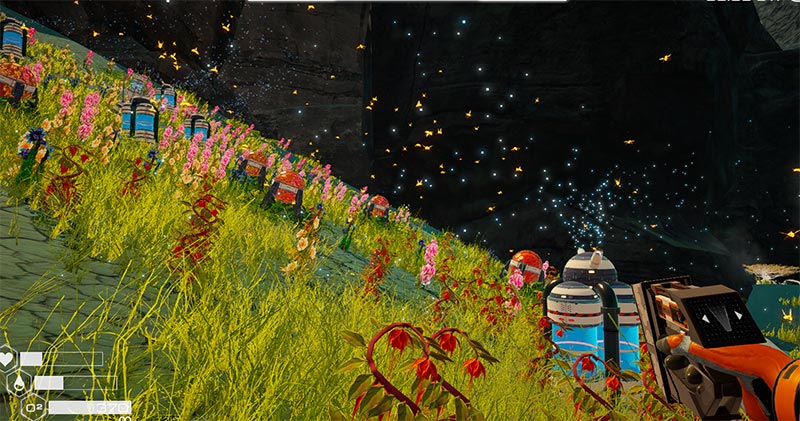 My bees!
My bees!
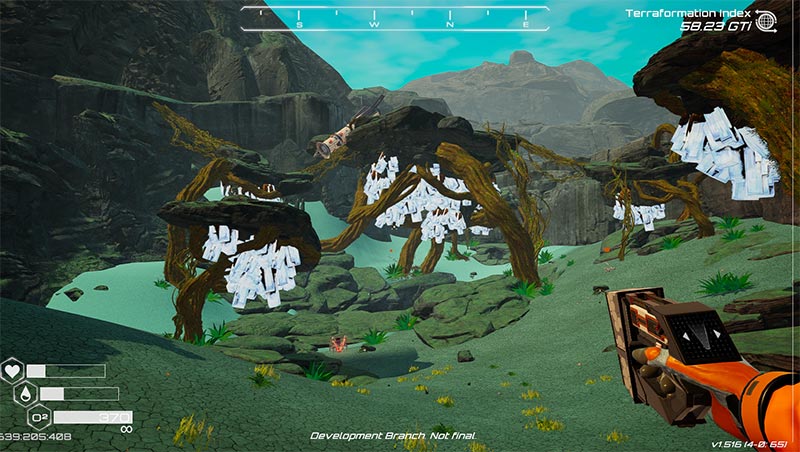 Zeolite crystal mining site
Zeolite crystal mining site
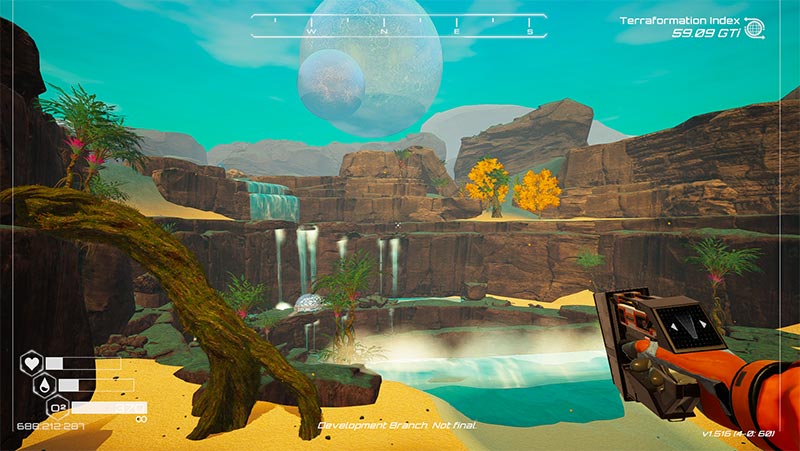 Cool Sinkhole. There is a cave behind the large waterfall.
Cool Sinkhole. There is a cave behind the large waterfall.
The new update is supposed to let you terraform more moons in this alien solar system. I’m excite!
Finally, we have gotten a couple of puzzled comments – mostly from international readers – regarding the widespread use of dishwashers in US. About 75% of US households have them. They are convenient, and we are encouraged to purchase them because they use less water. A typical modern dishwasher will use 3-4 gallons for a load of dishes, while washing the same load by hand uses 15-27 gallons. It also saves energy, because most people wash their dishes in hot water and heating that water adds up. To that one commenter who wondered why an off-the-grid home in the Southwest would need one – their water is likely limited. They are trying to conserve their resources. A small dishwasher can ran off solar, and washing dishes is not optional.
To the person who is now vigorously typing how their handwashing never uses that much water: Having a dishwasher doesn’t make you lazy, not having one doesn’t make you a dirty planet polluter. It’s a convenient appliance. Some people have space for it, some don’t, and there is no reason to have a moral superiority battle over it.
I’m trying to figure out what to read next. LitRPG is my new military SF. I usually read outside of the genre I’m working on and I’m unlikely to ever write a strict LitRPG. I am sadly out of the Azarinth Healer. I have Bushido Online in my library for some reason. Maybe I will try that one next.
The post Life and Other Dishes first appeared on ILONA ANDREWS.
Spotlight on “Ecstasy” by Ivy Pochoda
Ecstasy is a deliciously dark horror reimagining of a Greek tragedy, by Ivy Pochoda, and…
The post Spotlight on “Ecstasy” by Ivy Pochoda appeared first on LitStack.
Review: Level: Ascension by David Dalglish

Buy Level: AscensionRead our review of Book 1, Level: Unknown
FORMAT/INFO: Level: Ascension was published by Orbit Books on May 13th, 2025. It is 400 pages long and available in ebook, audiobook, and paperback formats.
OVERVIEW/ANALYSIS: In order to save his world, Nick will have to end another. With a large black disc traveling closer and closer to his research station, Nick spends nearly all his time in the fantasy world of Yensere, a digital simulation created by a mysterious alien artifact. In Yensere, the god-king Vaan has frozen a similar looking black sun in the sky; this has prevented an apocalypse in Yensere but disrupted the patterns of time and nature in a way that seems to be destroying the world anyway, if more slowly. If Nick is to understand the doom that approaches his people, he will have to kill the god-king Vaan and unleash disaster on Yensere so that he can gain whatever knowledge he can. But before then, he'll have to defeat the god-king's chosen champions - a task that will come with a devastating cost.
Level:Ascension continues to expand its world in interesting ways, but the plot was overwhelmed by the sheer number of fight sequences. On the plus side we get to learn more about Frost, her origin, and how her sister went missing. It added some much needed personal stakes to the story beyond the also important "save the world." I also appreciated the teases we get indicating that Yensere isn't the only digital world contained within the alien artifact.
But these small nuggets of clues and character insight were overwhelmed by fight after fight after fight. On the one hand, I understand that a LitRPG is going to have a lot of battles in it, especially when it's inspired by a game like Dark Souls. Going from one epic fight to another is literally what that game genre is all about. But the more fights you have with everyone wielding awe-inspiring powers, the less exciting each encounter feels.
Don't get me wrong, in a vacuum the individual fights are impressive. As always, this author delivers a powerhouse finale that is a great set piece with personal stakes. But I could have used one or two fewer fights and a little more time expanding on some of the other characters. Sir Gareth, for instance, was a strong part of book one, but gets a bit left by the wayside in this sequel, a hazard of several new characters entering the playing field.
CONCLUSION: For some of you, hearing that Level: Ascension is chock full of impressive fight scenes is going to be fantastic news, and I encourage you to go give this series a try! For me, while I enjoy the overall concept of this simulated world, I had a bit of trouble finding the momentum in this particular outing. Perhaps with everything coming to a head in upcoming Level: Apocalypse, I'll find that momentum once more.

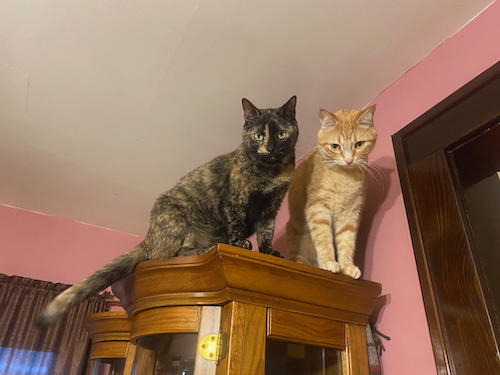
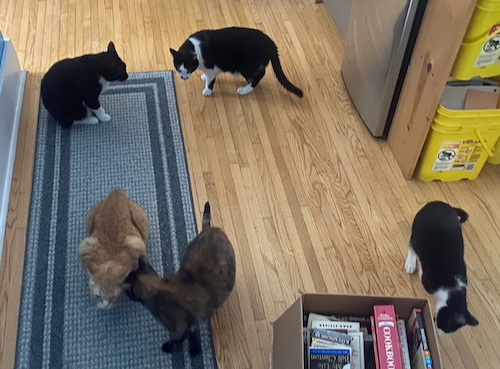
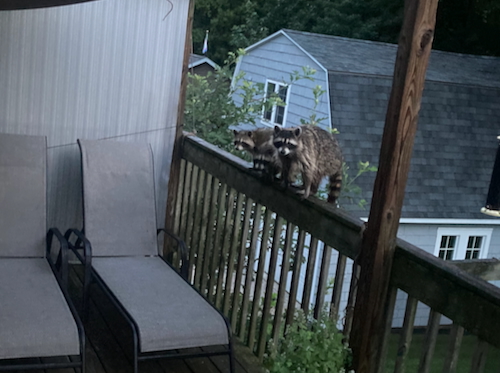
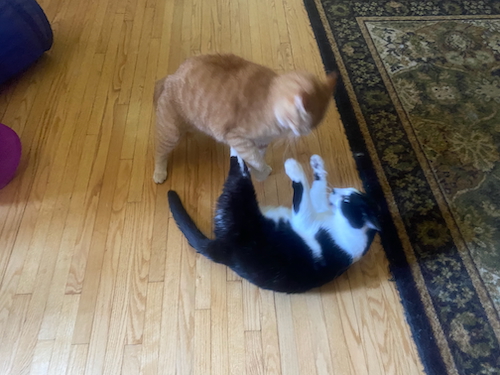
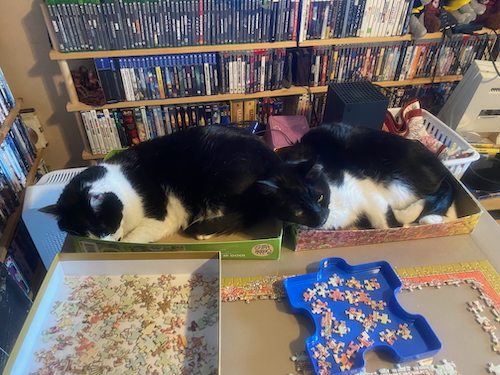
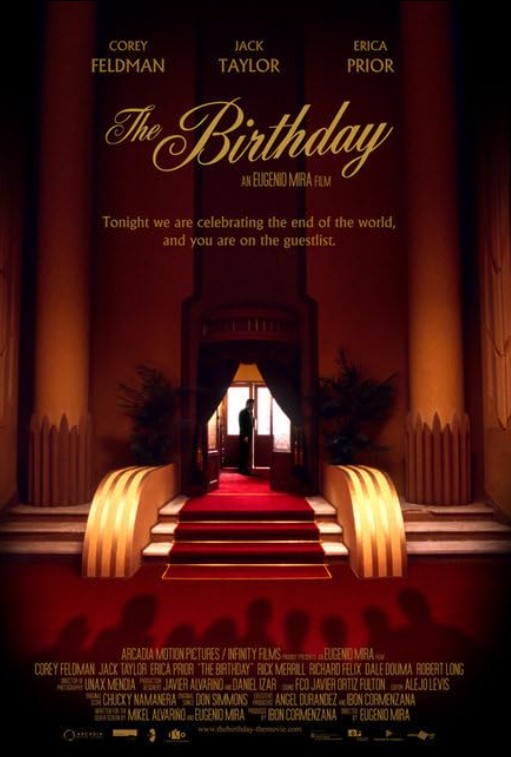
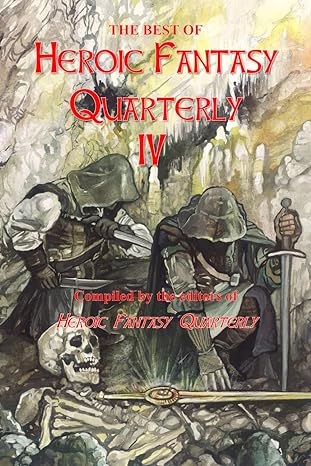
Recent comments